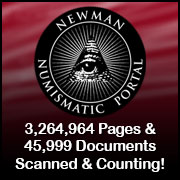
Visit our NBS Sponsors


About UsThe Numismatic Bibliomania Society is a non-profit association devoted to the study and enjoyment of numismatic literature. For more information please see our web site at coinbooks.org SubscriptionsThose wishing to become new E-Sylum subscribers (or wishing to Unsubscribe) can go to the following web page link MembershipThere is a membership application available on the web site Membership Application To join, print the application and return it with your check to the address printed on the application. Print/Digital membership is $40 to addresses in the U.S., and $60 elsewhere. A digital-only membership is available for $25. For those without web access, write to: Charles Heck, Treasurer AsylumFor Asylum mailing address changes and other membership questions, contact Chuck at this email address: treasurer@coinbooks.org SubmissionsTo submit items for publication in The E-Sylum, write to the Editor at this address: whomren@gmail.com BUY THE BOOK BEFORE THE COINSale Calendar
|
- WAYNE'S WORDS: THE E-SYLUM MARCH 7, 2021
- NBS BIBLIOTALK PODCAST LOOKS AT WHITMAN
- NEW BOOK: GERMAN EMERGENCY MONEY VOL. 3
- 2021 NNP SYMPOSIUM SCHEDULE ANNOUNCED
- VIDEO: HOUSTON MONEY SHOW COINS & CURRENCY
- MORE ABOUT NOTABLE NUMISMATIC THEFTS
- 1955 PENNYPACKER IRA REED ESTATE SALE
- NOTES FROM E-SYLUM READERS: MARCH 7, 2021
- VOCABULARY TERM: COSTUME JEWELRY MEDAL
- ÉDOUARD FROSSARD (1837/8-1899)
- SUBSCRIBER PROFILE: DR. HELEN WANG
- 2020 CANADA BEAVER COIN DESIGNER JUNE STEUBE
- WOMAN'S SUFFRAGE DESIGNER CHRISTINA HESS
- APOLLO 11 COIN DESIGNER GARY COOPER
- COIN OF THE YEAR: APOLLO 11
- FINDING RARE NUMISMATIC LITERATURE ONLINE
- AINA REMOTE SEMINAR ON JEWISH NUMISMATICS
- KAGIN'S MARCH 2021 EDUCATIONAL PRESENTATIONS
- THE 1455 CALAISIENNE MEDAL OF CHARLES VII
- NUMISMAGRAM SELECTIONS: MARCH 2021
- NUMISMATIC NUGGETS: MARCH 7, 2021
- RARE HAWAIIAN CURRENCY IN KAGIN'S AUCTION
- UNIVERSITY GIVEN COINS SEIZED AT BORDER
- THE UNIQUE BRASHER HALF DOUBLOON
- SRI LANKA TO REPLACE NOTE WITH NEW COIN
- IMITATION SOVEREIGNS & HALF SOVEREIGNS
- ORELL COLORED SCHOOL MEDAL
- 1921-S ZERBE PROOF MORGAN DOLLAR
- HAWAIIAN STARFISH PLANTATION TOKENS
- TWO-TAILED LIBERTY NICKEL BROCKAGE
- COUNTERFEITING AND MORMON MURDERS
- 1697 BANK OF ENGLAND NOTE
- MORMON BRIGHAM CITY CO-OP SCRIP
- VENEZUELA ISSUES NEW INFLATION BANKNOTES
- THE INSTAGRAMER'S FAKE BANKNOTE TOSS
- TECHNOLOGY UNLOCKS LOCKED LETTERS
- LOOSE CHANGE: MARCH 7, 2021
Click here to read the thin version on the web
Click here to subscribe
Click here to access the complete archive
To comment or submit articles, reply to whomren@gmail.com
Content presented in The E-Sylum is not necessarily researched or independently fact-checked, and views expressed do not necessarily represent those of the Numismatic Bibliomania Society.
WAYNE'S WORDS: THE E-SYLUM MARCH 7, 2021
 New subscribers this week include:
Tom Yoemans.
Welcome aboard! We now have 6,617 subscribers.
New subscribers this week include:
Tom Yoemans.
Welcome aboard! We now have 6,617 subscribers.
Thank you for reading The E-Sylum. If you enjoy it, please send me the email addresses of friends you think may enjoy it as well and I'll send them a subscription. Contact me at whomren@gmail.com anytime regarding your subscription, or questions, comments or suggestions about our content.
This week we open with a new Bibliotalk podcast, one new book, updates from the Newman Numismatic Portal, notable numismatic thefts, and more.
Other topics this week include the Ira Reed estate sale, costume jewelry medals, Ed Frossard, Helen Wang, coin designers June Steube, Christina Hess and Gary Cooper, the Coin of the Year, online educational presentations, auction previews, Hawaiian tokens and paper scrip, the Brasher Half Doubloon, a colored school medal, counterfeiting and the Mormon murders, Mormon scrip, and Venezuela's new one million bolivar note.
To learn more about Whitman Publishing, German notgeld, the NNP Symposium, 1866 No Motto silver dollars, March of Dimes encased dimes, the Romano Worthy Hoard, Chairman Mao badges, finding numismatic literature online, Hasmonean coins, the Calaisienne medal, To Hanover counters, and one very feisty and determined beaver, read on. Have a great week, everyone!
Wayne Homren
Editor, The E-Sylum
NBS BIBLIOTALK PODCAST LOOKS AT WHITMAN
The latest episode of the Numismatic Bibliomania Society podcast is now available for listening, and features an inside look at the numismatic hobby's largest publisher. Check it out! It's on the NBS web site but also available on Apple Podcasts, Spotify, and elsewhere. Vice-President/Secretary Len Augsburger provided this report. -Editor
NBS Podcast "A Look Inside Whitman, with Diana Plattner" Posted
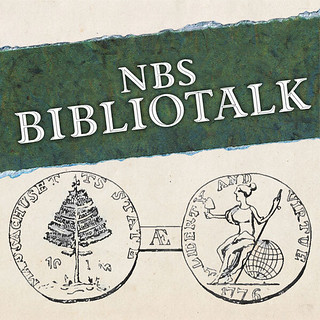 The latest episode of the NBS Bibliotalk podcast, "A Look Inside Whitman, with Diana Plattner" is now available on the NBS website and other popular podcasting platforms such as
Buzzsprout. Lianna Spurrier, Bibliotalk producer, interviews Diana Plattner, Senior Editor at Whitman Publishing.
The latest episode of the NBS Bibliotalk podcast, "A Look Inside Whitman, with Diana Plattner" is now available on the NBS website and other popular podcasting platforms such as
Buzzsprout. Lianna Spurrier, Bibliotalk producer, interviews Diana Plattner, Senior Editor at Whitman Publishing.
Plattner speaks to the evolution in publishing over the last generation, with digital platforms revolutionizing the industry and the various job functions within the book business. Diana offers a unique viewpoint, having launched and operated her own publishing firm for a number of years before returning to Whitman later in her career. Tune in for this in-depth look at the hobby's largest publishing house.
To listen to the podcast on the NBS web site, see:
https://www.coinbooks.org/resources/podcast.html
Link to "A Look Inside Whitman, with Diana Plattner" on Buzzsprout:
https://nbsbibliotalk.buzzsprout.com/

NEW BOOK: GERMAN EMERGENCY MONEY VOL. 3
The third volume of Anton Geiger's work on WWI-era German emergency money (notgeld) has been published. Here's a Google-translated description from the publisher's website. -Editor
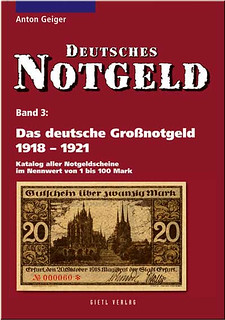 German emergency money, volume 3
German emergency money, volume 3
Anton Geiger
Published by Gietl Verlag
ISBN: 978-3-86646-533-6
Edition: 3rd edition 2010
Illustrations: numerous black and white illustrations
Softcover: 608 pages
Format: 14.8 x 21 cm
With the outbreak of the First World War, there was a shortage of small change coins - due to the fact that these were often made of high-quality materials (gold, silver, etc.) that people wanted to hoard for themselves. Countries, municipalities, cities and companies tried to counter this deficiency by circulating emergency money. Since a tremendous amount of such money was in circulation by 1923, Dr. Arnold Keller - the author of the first catalogs on German emergency money - proposed a classification that is still used today as a classification aid. The major emergency money had become necessary especially from 1918 - there were three phases of issuance that were separated from one another in time. The first large banknotes were needed in the period after the end of the First World War, the large emergency money from 1918 to 1921. This catalog lists emergency money issues from almost 600 issuing offices throughout the German Empire at that time. Above all, it makes its face value of 1 to 100 marks into large emergency money - in contrast to small change notes and the emergency money notes of high inflation. The detailed information on the notes and their variants as well as the updated market-driven reviews make this current edition a must for every collector of German banknotes and the interested layperson.
For more information, or to order, see:
Das deutsche Großnotgeld 1918 – 1921
(https://www.battenberg-gietl.de/sammeln/buch/das-deutsche-grossnotgeld-1918-1921)
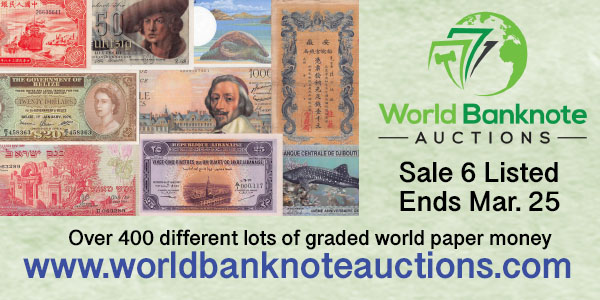
2021 NNP SYMPOSIUM SCHEDULE ANNOUNCED
The second NNP Symposium is nearly upon us. The schedule has been announced, and it's a humdinger. An amazing array of speakers is on tap, with topics all over the numismatic map. Follow the links below to register and review the schedule. Mark your calendars for your favorites! -Editor
NNP Symposium, March 19-21, 2021
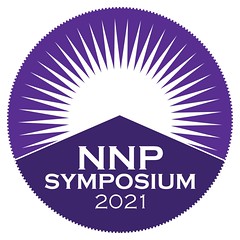 The NNP Symposium returns March 19-21, with a broad array of presentations. This is a free, three-day online event featuring some of the most compelling personalities in numismatics. Of particular interest to NBS members will be Kellen Hoard's presentation "Building Your Numismatic Reference Library in 2021," scheduled for 12PM eastern, Saturday, March 20. Our own Wayne Homren will be leading a panel discussion on "The Early Days of Online Numismatics," with Jim Halperin, George Cuhaj, and Craig Whitford.
The NNP Symposium returns March 19-21, with a broad array of presentations. This is a free, three-day online event featuring some of the most compelling personalities in numismatics. Of particular interest to NBS members will be Kellen Hoard's presentation "Building Your Numismatic Reference Library in 2021," scheduled for 12PM eastern, Saturday, March 20. Our own Wayne Homren will be leading a panel discussion on "The Early Days of Online Numismatics," with Jim Halperin, George Cuhaj, and Craig Whitford.
Of special note is a four-hour Young Numismatist (YN) block of presentations on Saturday morning, featuring speakers Jonas Denenberg, Garrett Ziss, Kellen Hoard, and Delmar Mineard, Jr. NNP Symposium speakers include Ken Bressett, John Kraljevich, Sarah Miller, John Brush, Shanna Schmidt, and a host of other prominent numismatists. Zoom links for the individual presentations will be forwarded to registrants shortly before the event.
Link to NNP Symposium schedule:
https://nnpsymposium.org/schedule
Link to NNP registration:
https://nnpsymposium.org/
Link to videos from the August 2020 Symposium:
https://nnp.wustl.edu/library/multimediadetail/539070
VIDEO: HOUSTON MONEY SHOW COINS & CURRENCY
These are selections from the David Lisot Video Library that feature news and personalities from the world of coin collecting. David has been attending coin conventions since 1972 and began videotaping in 1985. The Newman Numismatic Portal now lists all David's videos on their website at:
https://nnp.wustl.edu/library/multimediadetail/522852
Here's one on interesting coins at the recent Houston Money Show. -Editor
Cool Coins & Currency! Houston Money Show 2021.
VIDEO: 8:47.
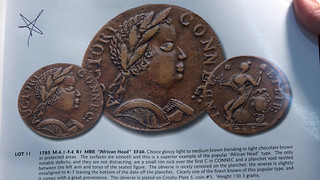 David Lisot, Interviewer, CoinTelevision.com with Lucas Baldridge, Matthew Burek, Pierre Fricke, Trent Schwartz, and Wade Spencer. January 23, 2021.
David Lisot, Interviewer, CoinTelevision.com with Lucas Baldridge, Matthew Burek, Pierre Fricke, Trent Schwartz, and Wade Spencer. January 23, 2021.
David Lisot goes around at the Houston Money Show to talk to the dealers and collectors who have bought or purchased some ‘cool" coins and paper money. Each participant offered specific advice how to buy coins. Some of the items shown include a 1901 Barber Half Dollar XF45, Connecticut Large Cent "African Head" EF 40, 1787 Connecticut "Muttonhead", 1787 Connecticut "Breen Plate Coin EF40, 1861 $10 Demand Note PMG VF20, and an 1834 Classic Head $2.5 PCGS MS64.
An excerpt of the video is available for viewing on the Coin Television YouTube Channel at:
https://youtu.be/Jc1dsSUxm4I
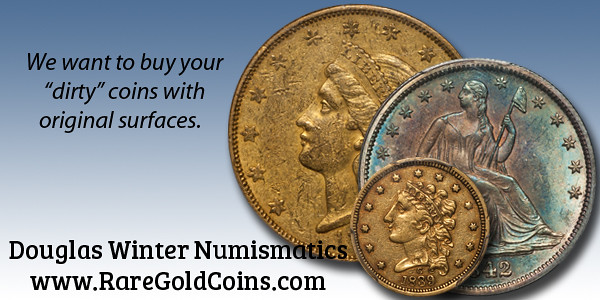
MORE ABOUT NOTABLE NUMISMATIC THEFTS
1831 Bibliothèque Nationale Theft Inventory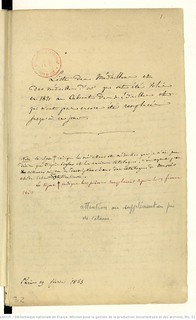
Last week Bruce Bartelt asked if there was "a full written account and inventory of the lost items" from the 1831 theft from the Cabinet of Medals of the Bibliothèque Nationale de France. Hadrien Rambach provided a link to just such a document. Thank you! It is Henry Cohen's manuscript Liste des médaillons et des médailles d'or qui ont été volées en 1831 au Cabinet des médailles et qui n'ont pas encore été remplacées jusqu'à ce jour, written in 1863. Here's the Google-translated description. -Editor
Registers produced for the management of collections kept at the Department of Coins, Medals and Antiquities (formerly Cabinet des Médailles). Collections. Movements of collections. Theft of 1831: list of missing coins and gold medals (1863).
To read the complete document, see:
Registres produits pour la gestion des collections conservées au Département des...
(https://gallica.bnf.fr/ark:/12148/btv1b53112338f/f13.item#)
Bruce Bartelt writes:
"Thank you to M. Rambach – quite a massive loss."
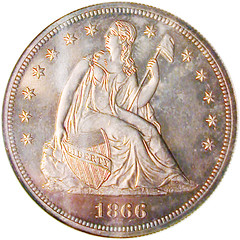
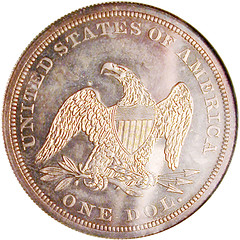
DuPont 1866 No Motto Dollar
Dave Lange writes:
"In Alan Weinberg's comments about famous coin thefts he observed that the DuPont Family's 1866 No Motto silver dollar was unique and was never recovered, but neither statement is true. John Kraljevich was able to confirm a piece he examined as the DuPont Specimen while he was working with Stacks-Bowers around 2004. A collector had contacted the company saying he had what he believed to be a rare coin, and that certainly was true. I don't believe its whereabouts between 1967 and 2004 was ever fully determined.
"There was a photo of myself holding that specimen after NGC certified it as PF-65, and I was in the company of Chris Karstedt and Dave Bowers. I don't recall where that photo was posted; it may have been in one of the old NGC newsletters. I'm attaching a couple photos of the coin. Unfortunately, they're low resolution, but they're good enough to distinguish this example from the Brand Specimen, which NGC graded PF-63 back in the 90s.
"Interestingly, in the late 1990s NGC certified DuPont's 1866 No Motto half dollar, which really is a unique piece, but it seems that the graders failed to recognize they were handling a great rarity and a coin that had been stolen decades earlier. A few weeks later, when I was trying to reconcile coins that failed to turn up data numbers in our Census, I saw that we'd certified an 1866 No Motto proof half dollar recently and asked whether anyone had thought to take a photo, explaining its significance. I was about to report the news to Coin World when the story broke that Superior had purchased the half across the counter, which is how it made its way to NGC. Incredibly, it was claimed that this unique rarity was acquired as just a proof type coin."
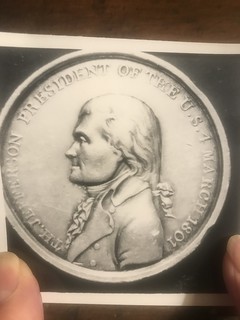 John Kraljevich (Virginia '99, Monticello staff 1997-99) writes:
John Kraljevich (Virginia '99, Monticello staff 1997-99) writes:
"Correction: the Inaugural medal picture Alan Weinberg submitted was stolen from the University of Virginia Library, not Monticello. Monticello has never suffered a theft from their small but important collection of numismatic items."
Thanks for setting us straight. Still an important missing item that hopefully can be located someday and restored to its rightful owners. -Editor
To read the earlier E-Sylum article, see:
MORE NOTABLE NUMISMATIC THEFTS
(https://www.coinbooks.org/v24/esylum_v24n09a14.html)

1955 PENNYPACKER IRA REED ESTATE SALE
"I recently came into my possession of an almost unknown coin auction catalog. It is the estate of coin dealer Ira Reed. Reed was a major dealer in the Philadelphia area. He conducted 29 auction sales, including the 1941 ANA convention sale. I have all except two in my library.
This estate sale was held May 16, 1955 at the Pennypacker Auction Center in Reading, Pa. 16 pages. It is a mystery to me why the widow Reed would not have sold this collection in Philadelphia instead of sending it to Reading. I am sure it was a financial sacrifice to her. But, in times of death, people do strange things.
The items (lots) in this sale are not numbered, so I'm not sure whether the items were grouped or sold individually - it could have been at the whim of the auctioneer. About 3/4 of the items were graded. Some were listed and not graded with a sentence at the top, "VG to Uncirculated and proof ". Under the heading of Silver Dollars are listed dates of 1805-1826. Perhaps these were Half Dollars? More than 100 gold pieces including Commemorative Gold Dollars, and 3 Three Dollar pieces Unc & Proof.
This sale had to be a buyer's dream to be at!! I COULD have been there but I did not know about it. I was 18 at the time, and had been collecting coins for about 5 years. I was at a meeting of the Reading Coin Club on May 9, a week before the sale, but have no memory of this important sale being announced. The next day, May 17, I attended a country coin auction in Ephrata, PA.
Also at that time each month I read the Numismatic Scrapbook Magazine cover to cover, and saw nothing of that sale. So, I find out about it 65+ years later!"
"Better late than never" doesn't apply to one-time opportunities. I have a couple of the important Pennypacker sales of early coppers and U.S. tokens, but not this one. I hadn't even been born yet, but as a collector of U.S. Civil War encased postage stamps I would have enjoyed the offering of some 46 different pieces, including a few scarce issuers and a scarce denomination.
A real rarity, a copy of this sale was sold in a June 2012 Kolbe & Fanning mail bid sale - we discussed it in a May 27, 2012 E-Sylum article. Here's the lot description. -Editor
An Unlisted Sale of the Ira Reed Collection
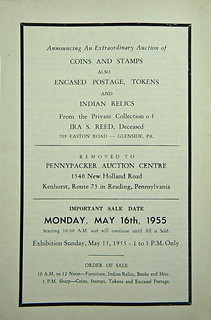 Reed685 Pennypacker Auction Centre. ANNOUNCING AN EXTRAORDINARY AUCTION OF COINS AND STAMPS, ALSO ENCASED POSTAGE, TOKENS AND INDIAN RELICS, FROM THE PRIVATE COLLECTION OF IRA S. REED, DECEASED. Kenhorst, Reading, Pa., May 16, 1955. 8vo, self-covered. 16 pages; no lots numbers: fine collection of stamps; (48) lots of encased postage; 9 pages listing U.S. federal coins; 3 pages listing Indian artifacts, books and furniture. Fine. (150.00)
Reed685 Pennypacker Auction Centre. ANNOUNCING AN EXTRAORDINARY AUCTION OF COINS AND STAMPS, ALSO ENCASED POSTAGE, TOKENS AND INDIAN RELICS, FROM THE PRIVATE COLLECTION OF IRA S. REED, DECEASED. Kenhorst, Reading, Pa., May 16, 1955. 8vo, self-covered. 16 pages; no lots numbers: fine collection of stamps; (48) lots of encased postage; 9 pages listing U.S. federal coins; 3 pages listing Indian artifacts, books and furniture. Fine. (150.00)
A previously unknown catalogue, unlisted in any numismatic bibliography of which we are aware. While most of the material is poorly described, the collection of encased postage is noteworthy, as is the provenance. Ira Reed was a Glenside, Pennsylvania coin dealer who issued a number of auction catalogues and other publications, including the 1941 ANA sale. He died in October of 1954. The fact that this sale apparently has been completely forgotten is really quite remarkable. Indeed, it is a month earlier than the earliest Pennypacker sale included by Gengerke.
To read the earlier E-Sylum article, see:
THE REED AND HOLLAND PENNYPACKER AUCTION SALES
(https://www.coinbooks.org/esylum_v15n22a24.html)
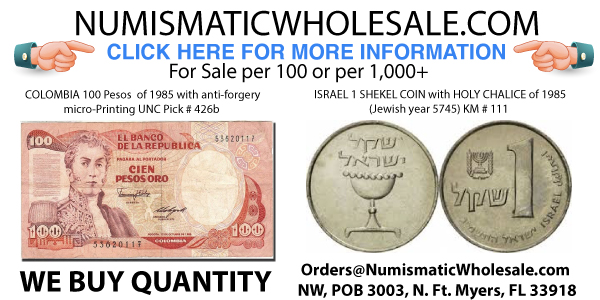
NOTES FROM E-SYLUM READERS: MARCH 7, 2021
The Newman Portal As An IndexBob Van Ryzin writes:
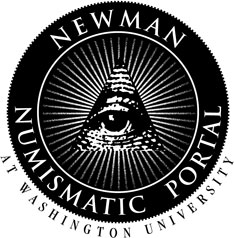 "I found an interesting and unexpected use for the Newman Numismatic Portal. I'm a past editor of Coins magazine and am currently writing a column for Numismatic News called "Past Times With Coins." It features items from the first issue of the magazine from 1962, when it became Coins, onward.
"I found an interesting and unexpected use for the Newman Numismatic Portal. I'm a past editor of Coins magazine and am currently writing a column for Numismatic News called "Past Times With Coins." It features items from the first issue of the magazine from 1962, when it became Coins, onward.
"I'm currently up to the 1963 volume and am working on a column with info on Francis Henning and his fake nickels.
"I have a nicely bound set of the magazines through 1982 but what I don't have is a complete index of its contents.
"Trying to get the story of Henning right, I searched newspaper archives and the Internet. The Internet search led me to NNP, where I found a good reference to the Henning story in the September 1964 issue of Coins.
"NNP is worth checking out -- at least it was for me."
Having a great numismatic library only gets you so far if you can't find what you're looking for. A number of in-copyright publications such as Coins, Coin World and soon Numismatic News are digitized on NNP but on a restricted basis - while you can't read the publication on the site you can still search the content to find where to look. Search engines are electronically compiled indexes, enabling users to start with the key words or phrases of interest and quickly locate instances of that text in millions of pages of content. -Editor
To visit the Newman Numismatic Portal, see:
https://nnp.wustl.edu/
Pete Smith writes:
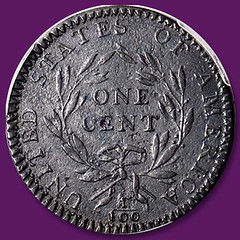 "I am familiar with the 1794 Starred Reverse Cent, having written a book on the topic that was
published in 1986. In the past thirty-five years I have compiled three updates that were published
in Penny-Wise, the journal of the Early American Coppers Club. In recent years, Al Boka has
maintained the census of known pieces but he and I continue to collaborate on the subject.
"I am familiar with the 1794 Starred Reverse Cent, having written a book on the topic that was
published in 1986. In the past thirty-five years I have compiled three updates that were published
in Penny-Wise, the journal of the Early American Coppers Club. In recent years, Al Boka has
maintained the census of known pieces but he and I continue to collaborate on the subject.
"It is frustrating to devote so many years to study and so much effort to keep the information current only to find that it is ignored. An example is in the recent auction catalog mentioned in the February 28 issue of The E-Sylum.
"The article mentions this from the catalog description, "Its scarcity has also stood the test of time for today only 60 or so examples are believed extant, the actual total perhaps as low as 50 to 55 coins." The number known is a bit fuzzy as some previously reported pieces are not represented by photos and may have been sold later without a pedigree match. The most recent update of the census was published in Penny-Wise in 2020. At that time Al Boka and I agreed that the number known is now 72.
"The cataloguer makes a statement about the number of known pieces, as though they are an authority on the topic and no source is mentioned. When such a statement is in error, it should be challenged.
"My criticism is not just of the current catalog but of auction catalogs in general. My recent interest has been the 1792 half disme. In almost every catalog description I see, there is some error indicating that the cataloguer did not have the most up-to-date information. That is the nature of cataloguing with the purpose of realizing the most for the coin and not necessarily reporting the most current information."
Pete beat me to my own planned comment - primary goal of the auction company is to sell the coin. While up-to-date information is also a goal, cataloguers operate under extremely tight deadlines and corners do get cut. I share Pete's frustration. The rest of us must always do the homework to ensure our knowledge is up-to-date. -Editor
To read the earlier E-Sylum article, see:
1794 STARRED-REVERSE CENT OFFERED
(https://www.coinbooks.org/v24/esylum_v24n09a32.html)
Neil Shafer writes:
"Since you've been covering these no-tip pieces I thought you might like to know of this one - it's 38mm diameter, aluminum and a nice copy of the Confederate 50c. I've had this for a fairly short while."
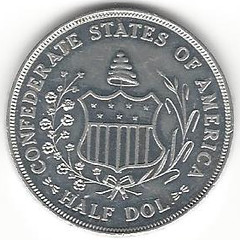
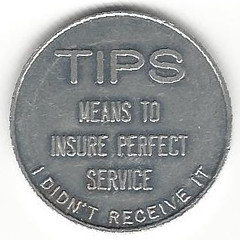
Interesting. I've seen plenty of Confederate Half Dollar copies, but none like this one. Thanks! -Editor
To read an earlier E-Sylum article, see:
ZERO CENTS NO-TIP KOOKIE KOIN
(https://www.coinbooks.org/v24/esylum_v24n02a28.html)
Bruce Perdue writes:
"Dave Lange's image of the March of Dimes Lapel Pin reminded me of a couple of items in my collection. Both encased dimes. One in plastic one in brass."
Thanks! here are Bruce's images. -Editor
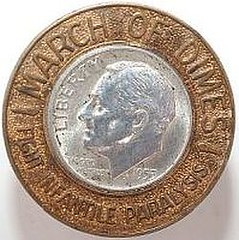
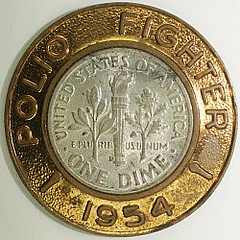
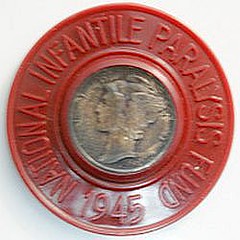
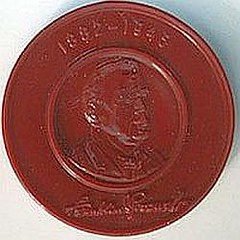
To read the earlier E-Sylum article, see:
NOTES FROM E-SYLUM READERS: FEBRUARY 28, 2021 : March of Dimes Lapel Pin
(https://www.coinbooks.org/v24/esylum_v24n09a16.html)
Michael Merrill writes:
"This is an 1897 5 1/4" x 2 1/2" cloth bag tag from "Philada." Mint. Times have changed. Today, "Philly" is used, as in famous cheesesteak hoagie, not yet invented way back then."
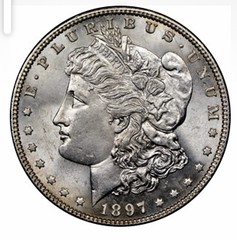
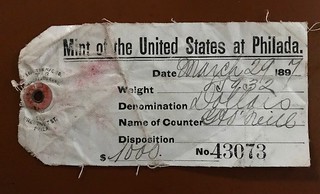
Cool. Thanks. I'd never seen one of these before, but I guess they became common when the Treasury began releasing dollar bags in the 1960s. But how many people bothered to save them? -Editor
Paul Montz writes:
"Do you know anyone that is specializing in exonumia books as Rich Hartzog (World Exonumia Press) used to? I think this might be a question that many would like to know the answer to!"
I'm afraid I don't know of any such dealer. I miss Rich. He was a great resource. It's a hard business to make money in. You have to do it on the side, like Rich did. Especially today, when people seem to think the internet has all the info you'll need. That's not at all true, especially when it comes to exonumia. Most of the books are under copyright. -Editor
Tom Harrison writes:
"With the loss of Fred Lake, who frequently carried a nice selection of exonumia books in his auctions, we seem to be left primarily with internet options for purchasing these often inexpensive, but valuable books."
Token seller Steve Hayden does offer some books on his website, but it's a very small selection compared to what Rich had. Len Augsburger recommends Abebooks and Bookfinder, linked below. See also the article elsewhere in this issue about UsedBookSearch, a site that aggregates results from multiple used book websites. -Editor
Steve Hayden adds:
"The books were handled by a local guy who worked for Rich for many years. He worked diligently to sell most of the salable books long ago. Myself, Paul Cunningham and many others purchased titles from him that fit our customer bases. He also sold and perhaps still does sell on eBay. Bottom line is that most are sold except for some Rich had massive quantities of, particularly ones that have been superseded with more recent editions."
Links:
https://www.abebooks.com/
https://www.bookfinder.com/
https://civilwartokens.com/Browse/C507238/Books
https://www.usedbooksearch.net/
Bob Merchant writes:
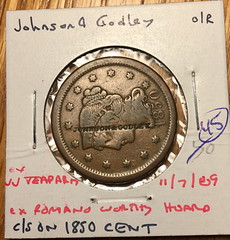 "Can anyone shed light on this coin hoard? I have a countermarked US Large Cent with a coin holder that references this hoard. My guess is that it may have been a US Large Cent hoard? An internet search does not turn up anything useful. My copy of the Dave Bowers coin hoard book is not accessible at the moment. If someone has information they can share, then please email me at
bm19425@yahoo.com. Thank you!"
"Can anyone shed light on this coin hoard? I have a countermarked US Large Cent with a coin holder that references this hoard. My guess is that it may have been a US Large Cent hoard? An internet search does not turn up anything useful. My copy of the Dave Bowers coin hoard book is not accessible at the moment. If someone has information they can share, then please email me at
bm19425@yahoo.com. Thank you!"
Can anyone help? I'm not familiar with the "Romano Worthy hoard." Don Corrado Romano was a Massachusetts coin dealer, as was J.J. Teaparty. Romano operated the Worthy Coin Company. -Editor
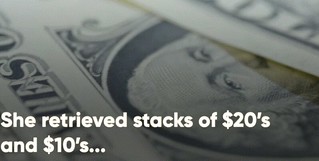 Passing along this video,
Kavan Ratnatunga writes:
Passing along this video,
Kavan Ratnatunga writes:
"A perfect reply to banks that have put limits on teller transactions that can be done with a bank card."
Funny, and spot-on. Check it out. -Editor
To watch the video, see:
Never Mess With Old People.
(https://www.facebook.com/SarcasmLol/videos/733263594248298)
Dennis Tucker writes:
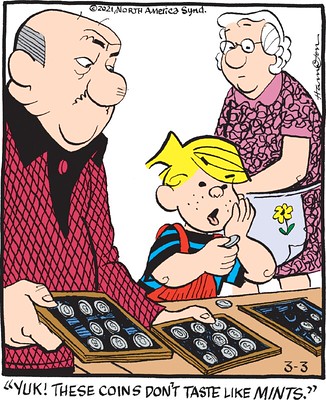 "You'll undoubtedly be besieged with outraged submissions of Wednesday's installment of the "Dennis the Menace" comic.
"You'll undoubtedly be besieged with outraged submissions of Wednesday's installment of the "Dennis the Menace" comic.
"Apparently Mr. Wilson has described his Morgan silver dollars as being in "Mint State," and his non-numismatic nemesis gets it all wrong—with a predictable decline in market value.
"You'd think that after seventy years (yes, "Dennis the Menace" debuted seventy years ago, on March 12, 1951!), Mr. Wilson would know better than to show Dennis his collection without gloves, a face-mask, a padded surface to protect accidentally dropped coins, and a paid-in-advance insurance premium."
Ouch! -Editor

VOCABULARY TERM: COSTUME JEWELRY MEDAL
Here's another entry from Dick Johnson's Encyclopedia of Coin and Medal Terminology. -Editor
Costume Jewelry Medal. An imitation decoration or medallic item made to wear on costumes and fake uniforms. Such medals are usually gaudy, with bright colors and light weight. Most are thin shells made by embossing and have colorful ribbons. Primarily made for theatrical use, the designs may be innocuous or in direct imitation of existing decorations. As copies they are best described as facsimiles. While most costume jewelry medals are intended for theatrical use (stage, TV, film), a fashion fad arose in the early 1980s, climaxing in 1984, in which decorations and medals were a fashion accessory. Many such fantasy medals were created closely resembling genuine decorations. (This infuriated legitimate recipients of original award medals, but, thankfully, the fad was short lived.) Most costume jewelry medals have very little collector value. See copies and replicas.
ÉDOUARD FROSSARD (1837/8-1899)
Here's another entry from the online draft of John Lupia's book of numismatic biographies. Thanks! This is an excerpt with the full article and bibliography available online. This week's subject is dealer Ed Frossard. NOTE: Pete Smith's American Numismatic Biographies gives a birth year of 1837. -Editor
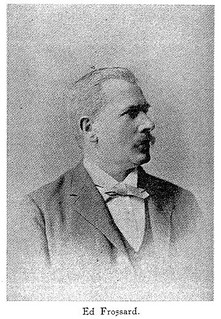 Frossard, Édouard (1837/8-1899), 53 Prospect Place, NY. 787-789 Broadway, NYC, NY. Irivington-on-the-Hudson.
Frossard, Édouard (1837/8-1899), 53 Prospect Place, NY. 787-789 Broadway, NYC, NY. Irivington-on-the-Hudson.
ANA member no. 14. He was born near Lake Leman, better known as Lake Geneva, Switzerland. He probably came from the southeast shore around Canton Vaud since records of a family of the name Frossard are found there. He and his brothers Adolph and Eugene came to America in 1857/8 and moved to Brooklyn, New York. In 1861, he taught languages at the French and classical school of A. Boursand, Brooklyn, New York.
During the Civil War he and his brothers joined the volunteer services. Adolph died during the Battle of Shenandoah Valley. Eugene became an officer in the regular army. Edourad joined as a Sergeant Major and became Colonel of Co. I. 31 Regt. U.S.V. He was several times named for distinction for bravery on the battlefield. He also served for six months at Fort McHenry, Baltimore as a Judge Advocate of a General Court Martial. He was crippled at the Battle of Mary's Heights. "Having been badly crippled in the field, he was obliged to relinquish military life, for which he had decided taste and returned to New York State, where he has since resided."--The Numismatist, March, 1892, page 32.
After the war he established a school for French at Irvington-on-the-Hudson, New York. And, also taught French at the Young Mens' Christian Association (YMCA) in Brooklyn, New York.
In 1872 he began collecting Large Cents for himself and George W. Merritt, the son of the wealthy owner of the palace at Irvington, New York. In 1875 he became the editor of the Scott & Co. publication Coin Collector Journal, a position he held from December 1875-December 1877. David Proskey was hired by John Walter Scott to replace Ed Frossard as editor of the Coin Collector Journal, and cataloguer of the coin auction sales. By January 1878 Frossard became an independent full time coin dealer, editor publisher. A donor, in 1878,to the ANS library. Between 1877 and 1892 he conducted over 100 coin auction sales and compiled catalogues for W. E. Woodward, Bangs & Co., H. G. Sampson, and others. He cataloged the Montayne collection of 1,200 lots for H. G. Sampson in the course of only forty-eight hours.
He began publishing Numisma in 1877 after leaving the firm of Scott & Co. as editor of the Coin Collector Journal, and completing the first 13 issues of volume 1. Charles Davis described this publication as:
"An often acid, often scholarly, always entertaining journal with important, although sometimes axe-grinding observations on the business practices of his competitors, and invaluable for reports on contemporary auctions with notices of over-grading and counterfeits liberally sprinkled in. Arrows were shot at, among others, Doctor Woodward (the apothecary unable to sell the false talisman to the children of Knicker), Charley Steigerwalt (the plagiarist with his big journal), Brother Mason (the only original Moses in the coin trade), J.W. Scott (the Fulton Street octopod), the Chapmans (who produce quarto catalogues with margins sufficiently large for corrections), and David U. Proskey (with a level head and an India rubber conscience)."
In 1879 he authored the Monograph of the United States Cents and Half Cents 1793-1857 illustrated by coins from the collections of his long-time associates and patrons Merritt and Parmelee.
He traveled to England in 1880 reporting it in Numisma, September (1880). Mason says that others tell him that "he talks, writes and reads modern languages in New York city in the day time, juggles coins in the evening, and snores to the happy midnight hours away at his delightful retreat, "Irvington-on-the-Hudson."
Frossard and William Elliot Woodward did not get along and feuding between these two mammoth dealers was fierce from 1880 to 1881.
On December 22, 1891 he held his 109th coin sale, the F. B. Bennell collection.
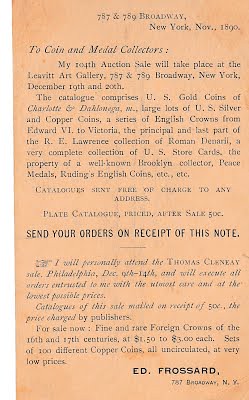 He served as the first Counterfeit Dectector to the ANA. In the May 1892 issue of The Numismatist Heath humorously asked the ribald
question : "Brother Tatman to please make our friend Frossard, Counterfeit Detector, instead of Counterfeit Director.
He served as the first Counterfeit Dectector to the ANA. In the May 1892 issue of The Numismatist Heath humorously asked the ribald
question : "Brother Tatman to please make our friend Frossard, Counterfeit Detector, instead of Counterfeit Director.
In 1893 he, along with W. W. Hays, authored Varieties of United States Cents of the year 1794 which was reprinted by Thomas Elder in 1910. His collection of 1794 cents was sold in his auction of October 2-3, 1884.
He died on Wednesday, April 12, 1899 at his home at 221 Lexington Avenue, New York. In a letter sent to the Chapman brothers by Charles Steigerwalt he commented how Frossard's death was sudden and unexpected. The funeral service took place at his home on Thursday, April 14th. He is buried in the White Plains Rural Cemetery, White Plains, NY.
He conducted 159 auction sales before his death on April 12th, 1899. The final catalog of the R. S. Robertson collection, sale no. 160, was held on April 14, 1899 two days after his death. His son Edouard, Jr. took over his father's business and conducted his first sale on June 27, 1899 with sale no. 161. Among the notable collectors for whom Frossard acted as a personal agent was T. Harrison Garrett, the railroad and banking tycoon of Maryland.
To read the complete article, see:
FROSSARD, ÉDOUARD
(http://www.numismaticmall.com/numismaticmall-com/frossard-edouard)
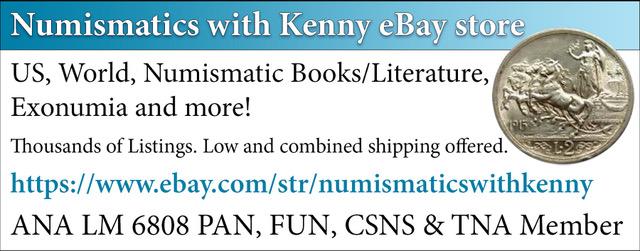
SUBSCRIBER PROFILE: DR. HELEN WANG
This profile of Helen Wang is excerpted with permission from the December 2020 issue of The Chopmark News. Thanks. -Editor
In this issue I interview Dr. Helen Wang. Dr. Wang is Curator of East Asian Money at the British Museum. She has extensive knowledge of East Asian numismatics and has written several books on the subject. She also runs the website Chinese Money Matters. I interviewed her by email.
CG - Colin Gullberg HW - Dr. Helen Wang
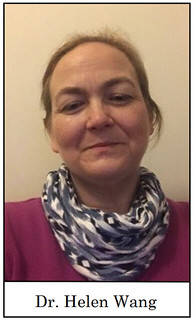 CG: Tell me about your background. When did you get started collecting and/or researching coins? When did your interest in coins
start?
CG: Tell me about your background. When did you get started collecting and/or researching coins? When did your interest in coins
start?
HW: A couple of years after I finished my BA in Chinese at SOAS, London, I applied for a job at the British Museum, to be assistant curator working with Joe Cribb in the Department of Coins and Medals. I had no prior knowledge of numismatics and learned on the job, including doing a part-time PhD Money on the Silk: the evidence from Eastern Central Asia to c. AD 800. I'm not a collector though.
CG: From the British Museum's website I understand you are Curator of East Asian Money. What exactly do you do in this position?
HW: I look after the museum's large collection of East Asian money (coins, banknotes, charms, silver ingots and other money-related items), and help to make it accessible via research, publications, catalogues, the BM Collection Online database, talks, exhibitions, public enquiries, et cetera, and as a member of the departmental team, do broader numismatic and museum work, for example with the various numismatic societies and the International Numismatic Council's Survey of Numismatic Research.
CG: You have written on a wide variety of numismatic topics. Can you introduce your research to us? What research are you currently doing into coins or medals?
HW: Most of my publications relate to the BM's collection of East Asian money – my earliest research was on Chinese secret society membership tokens and certificates, and some of my recent work has been on the history and current state of the field. I've also researched money on the Silk Road, and twentieth-century (Mao badges, paper money, tokens), and other projects.
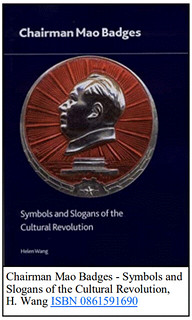 CG: Are there any important public coin collections in Britain
outside the British Museum? What about numismatic libraries? Are these collections accessible online?
CG: Are there any important public coin collections in Britain
outside the British Museum? What about numismatic libraries? Are these collections accessible online?
HW: Yes, there are important public coin collections – for example, the Heberden Coin Room at the Ashmolean Museum in Oxford; Coins and Medals at the Fitzwilliam Museum in Cambridge; the Royal Mint Museum in Llantrisant; and the Brotherton Collection in Leeds.
In fact, many museums in the UK have collections of coins. The Money and Medals Network has a directory of these on its website, and the list on my website Chinese Money Matters draws heavily on that directory.
For numismatic libraries, there's the Department of Coins and Medals at the British Museum, the Ashmolean and the Fitzwilliam. There's also the shared library of the Royal Numismatic Society (RNS) and the British Numismatic Society (BNS), housed at the Warburg Institute, London. Charles Aylward at the Cambridge University has built up an excellent Chinese numismatic library there too.
CG: What have been the major changes in numismatics over your lifetime?
HW: Changes in technology and communications have changed the way we do everything. It's hard to imagine life without computers, digital resources, online search engines, email, mobile phones, digital cameras, scanners, PowerPoint, social media, and now Zoom.
For information on the Chopmark Collectors Club, contact chopmarknews@gmail.com. -Editor
2020 CANADA BEAVER COIN DESIGNER JUNE STEUBE
I always look for these artist interviews in local publications - they can provide a great deal of good background information on both the artists and their designs. We have three of them this week, starting with this one from Canada. I added the coin image. -Editor
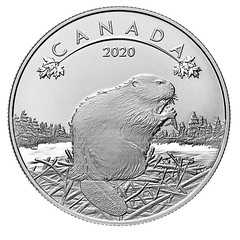 A Canadian icon is helping June Steube realize a long-held dream.
A Canadian icon is helping June Steube realize a long-held dream.
The former Sault Ste. Marie resident's artwork of a beaver is featured on a new Royal Canadian Mint coin.
The Sault Collegiate Institute graduate's illustration of a beaver appears on a silver coin with a face value of $10. It's part of the mint's O Canada! series.
"It was very exciting for me," Steube told The Star of her accomplishment. Having the mint share her artwork on a coin was "like a bucket-list item.
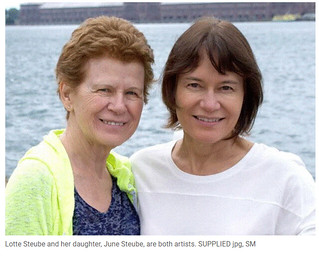 "I think the idea of actually holding one in my hand that I had designed was important to me," she said during a telephone interview from Kanata, Ont. "I knew it would matter to my parents."
"I think the idea of actually holding one in my hand that I had designed was important to me," she said during a telephone interview from Kanata, Ont. "I knew it would matter to my parents."
Steube is the daughter of Lotte and the late Bert.
She still has a coin featuring an eagle she received from her grandparents, Berthold and Margarethe Steube, when she was a child.
Steube's work was chosen through a competitive process.
"Her design is iconic, detailed and visually appealing all at once," said public affairs co-ordinator Pascale Poulin in an email.
Steube had researched the beaver's history of Canada for a planned book for children.
"Her understanding of the theme translated very well into an iconic composition of the beaver," said Poulin.
Steube wanted to show how "very feisty and determined" beavers are in her illustration that was done by pencil on paper.
"I research for a couple of days and gather books, photos, and videos," said Steube of her approach. "When drawing an animal I usually try to see it from all angles and points of view so I can imagine it in three dimensions. I will even look up its skeleton and musculature. The habitat needs to be accurately portrayed including the appropriate species of tree, for example."
The beaver is the first mint coin to feature Steube's artwork. She competed for consideration for two other coins in 2002 and 2012.
To read the complete article, see:
New coin features Steube's artwork
(https://www.saultstar.com/news/local-news/new-coin-features-steubes-artwork)
THE BOOK BAZARRE
WOMAN'S SUFFRAGE DESIGNER CHRISTINA HESS
Lancaster Online has a great interview with Christina Hess, designer of the Woman's Suffrage dollar coin. -Editor
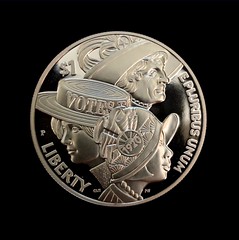
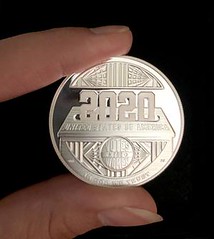
Some artists struggle to figure out ways to make money from their art. Not Christina Hess, a Philadelphia-based artist and chair of the illustration department at Pennsylvania College of Art & Design. Hess literally used her art to make money.
The year 2020 marked the centennial anniversary of the ratification of the 19th Amendment — the law that granted women the right to vote. The United States Mint celebrated the anniversary with the release of a silver dollar commemorative coin. Hess' illustrations are featured on the coin.
Hess, who grew up in Lititz and is a graduate of Warwick High School, says she's voted in every presidential election since she reached legal voting age. But, she says learned a lot about the suffragette movement while creating the illustrations for the coin.
"It really hit home because it was one of those things that you take it for granted," says Hess during a phone interview that took place one day after the presidential inauguration, when Kamala Harris became the first woman was sworn in as vice president.
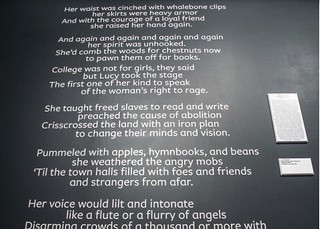 The heads side of Hess' coin features three women from three different eras. The reverse shows the year 2020 sliding into a ballot box decorated in an art deco style. The coin itself, as well as framed printed designs, are on display now as part of the PCA&D biannual faculty art exhibit, which runs through May. Due to COVID-19, the PCA&D gallery is still not open to the public, but works from the exhibit can be found online at
pcad.edu.
The heads side of Hess' coin features three women from three different eras. The reverse shows the year 2020 sliding into a ballot box decorated in an art deco style. The coin itself, as well as framed printed designs, are on display now as part of the PCA&D biannual faculty art exhibit, which runs through May. Due to COVID-19, the PCA&D gallery is still not open to the public, but works from the exhibit can be found online at
pcad.edu.
Hess connected with the U.S. Mint through its Artist Infusion Program, which contracts artists to create and work on designs for coins and medals.
Hess responded to the Mint's call for submissions for the program after it was posted on LinkedIn in 2019. More than 350 artists applied, and Hess was one of 27 artists selected for the program. The artists submit illustration concepts for quarters, silver dollars and Medals of Honor.
The women's suffrage commemorative silver dollar coin is considered a collector's item, but former President Donald Trump also approved it as legal tender. The coin, which is valued at $1 as legal tender and retails at $69-$75 as a collector's item, is currently sold out.
Hess has worked on several designs, but this is the first coin she's worked on that was minted. After the illustrations are approved, they go to the sculptors, who make a physical model of the design, followed by a digital 3D model.
"The sculptors do an absolutely amazing job with that process," Hess says. "They just work magic."
"When I started looking at the women's suffrage movement, I was looking at the years. I had no idea how many decades it spanned," Hess says. "One of the things I wanted to incorporate was, not only age and ethnicity, but I also wanted to incorporate the different periods of time."
Hess' solution was to look at the fashions from the mid-1800s to the earlier 1900s, specifically the hat, like boaters (popular in the late 19th century) and cloches (often seen in early 20th-century fashions).
"The way I thought about doing that was the actual hats that they're wearing," Hess says. "I did a lot of research on women's marches and what exactly they were wearing, and what they were carrying and what the buttons looked like."
The models for Hess' women all came from antique public domain photos she found online. One of the images came from an unlikely place.
"The lady in the upper right was actually from a mug shot," Hess says. "I don't know what her crime was, but she had such a great face. I was like, this is it! This is a face from history from that time period, and she's got such great features that I thought would be prominent on a coin."
To read the complete article, see:
PCA&D educator Christina Hess designed the U.S. Mint's women's suffrage coin
(https://lancasteronline.com/features/pca-d-educator-christina-hess-designed-the-u-s-mint-s-women-s-suffrage-coin/article_c44c79de-7854-11eb-b5f6-df1ff7c64894.html)
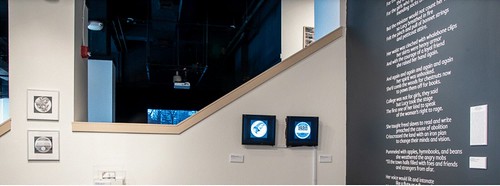
For images of the exhibit, see:
2021 Faculty Biennial
(https://pcad.edu/gallery_exhibit/faculty-biennial-2021/)
Back in 2000 the Naples Bank Note Company (NBNC) intended to offer the European Central Bank the opportunity to have a US company print the Euro. In order to get samples to submit to the ECB, Naples Bank Note designed this One Million Euro Commemorative, complete with over 20 security features, including some never used before and only original to NBNC. These are the last sheets remaining. For collectors only.
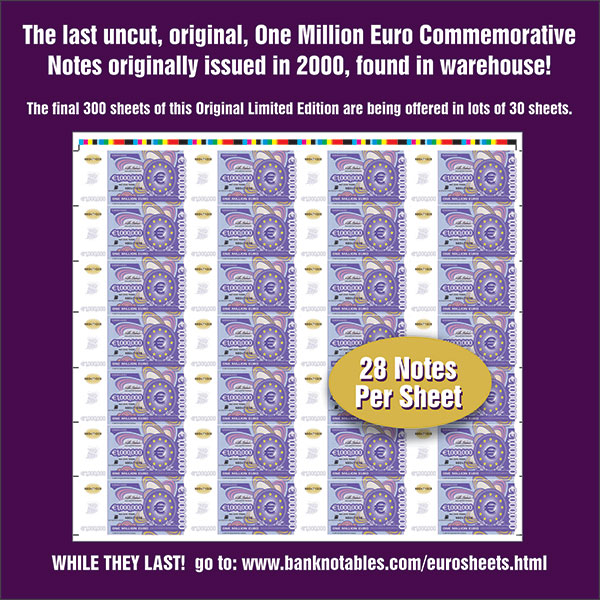
APOLLO 11 COIN DESIGNER GARY COOPER
Here's an interview from the Bangor Daily News with artist Gary Cooper of Belfast, ME, designer of the Apollo 11 lunar landing coin. -Editor
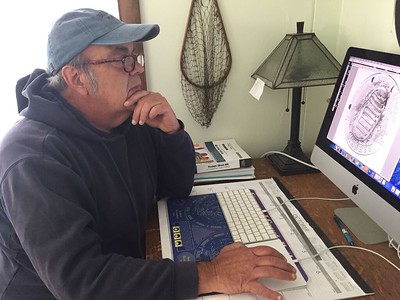
The coin designed by a Belfast sculptor to commemorate the 50th anniversary of the Apollo 11 lunar landing has just won the international 2021 Coin of the Year award.
Gary Cooper, whose lifelong dream was to design a coin for the U.S. Mint, said that it was a big surprise to learn that the coin had won the competition. Three years ago, his sculpted design of astronaut Neil Armstrong's footprint in the lunar dust was selected by Mint officials to be on the obverse side of the special coin, which was released in 2019.
"I think it's really special," he said of the award. "Maybe it's because I wasn't just designing a coin and sending it in and seeing what happened. I really had a lot of emotional interest. I remember exactly where I was the day the astronauts landed on the moon. My father bought me a telescope, and the neighborhood kids and I were trying to find the manned module that was going around the moon … It was a wonderful thing, and I remember it quite fondly."
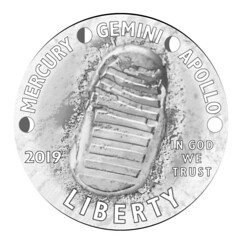 The commemorative coin was the first in the United States to be made with a curved design. The reverse, or convex, of the coin features a representation of a close-up of a famous photo taken on July 20, 1969, that shows part of astronaut Buzz Aldrin's helmet. In the helmet's reflection, you can see Armstrong, the U.S. flag and the lunar lander "Eagle." It was designed by a sculptor-engraver who works at the mint.
The commemorative coin was the first in the United States to be made with a curved design. The reverse, or convex, of the coin features a representation of a close-up of a famous photo taken on July 20, 1969, that shows part of astronaut Buzz Aldrin's helmet. In the helmet's reflection, you can see Armstrong, the U.S. flag and the lunar lander "Eagle." It was designed by a sculptor-engraver who works at the mint.
The Mint used the designs for a $5 gold coin, a standard-size $1 silver coin, a half dollar clad coin and a 5-ounce, heavier-than-usual $1 silver proof coin.
The Coin of the Year program, which is in its 38th year and is run by World Coin News, is aimed at recognizing outstanding coin design and innovation around the world. The 2021 program honors coins from 2019 in 10 competition categories, and the 5-ounce silver Apollo coin won awards for best contemporary event and best silver coin, as well as the overall Coin of the Year.
And even though he was the designer, he still had to buy his own coins just like anyone else.
He's also not sure if he'll be invited to go to the awards ceremony later this month. In typical years it's held in Berlin, Germany, and attended by the artist, the engravers and representatives of the Mint. This year, it will be held virtually, and because of that format, it's possible organizers will need to limit the number of people involved. But it's been gratifying to see the coin win international accolades, he said, and great to commemorate the space program and moon landing in this way.
To read the complete article, see:
Belfast artist's Apollo coin wins international award
(https://bangordailynews.com/2021/03/06/news/midcoast/belfast-artists-apollo-coin-wins-international-award/)
COIN OF THE YEAR: APOLLO 11
The U.S. Mint's Apollo 11 coin has won top honors for coins dated 2019. Here's an excerpt from Numismatic News. See the complete article online for all the year's winners. -Editor
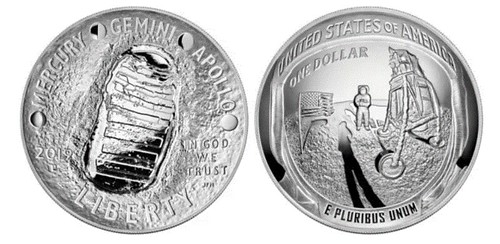
"The Eagle has landed." The now-famous phrase spoken by United States astronaut Neil Armstrong was a victory cry heard across the globe when he and Buzz Aldrin were the first humans to land on the moon on July 20, 1969.
The monumental feat was celebrated worldwide, and now the international coin community is celebrating the United States as its 2019-dated silver coin commemorating the 50th anniversary of the Apollo 11 lunar landing is named the winner of the 2021 Coin of the Year awards.
The Coin of the Year program, now in its 38th year, is an internationally conducted competition presented by World Coin News to recognize outstanding coin design and innovation worldwide. The 2021 program – sponsored by The Journal of East Asian Numismatics, NumisCollect and China Gold Coin Incorporation – honors coins dated 2019 in 10 categories of competition as decided by an international panel of judges.
The 50th Anniversary of the Moon Landing coin is a 5-ounce, 3-inch-diameter proof silver dollar with a curved shape. It won two COTY category awards.
"In the first round of COTY voting by category, the United States Mint 5-ounce Apollo 11 dollar received twice as many votes in Best Contemporary Event as its closest competitor," said Tom Michael, COTY coordinator, World Coin News contributor and market analyst. "It was nominated again in the Best Silver Coin category, where the voting was much more competitive, so I think the event itself was the most significant factor in early voting. However, I am sure that theme, design and challenging production must all have factored into the judges' decisions on the final vote for overall Coin of the Year, where voting was quite competitive."
To read the complete article, see:
Apollo 11 Coin Lands Top COTY Honors
(https://www.numismaticnews.net/coin-of-the-year/apollo-11-coin-lands-u-s-top-coty-honors)
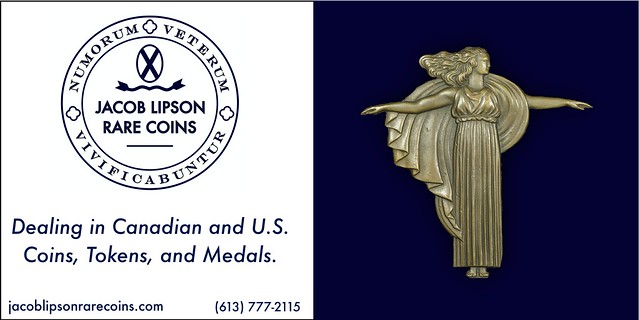
FINDING RARE NUMISMATIC LITERATURE ONLINE
Sylvia Nankivell of Used Book Search submitted this article on finding rare numismatic literature online. Thanks. -Editor
Tips for finding rare numismatic literature online
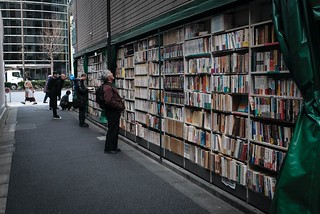 A numismatic history is the history of the world. For centuries people have relied on all that glitters for financial transactions. Coins fuelled global economies for a long time. Meanwhile, the highest honours in the land are bestowed in the shape of shiny medals.
A numismatic history is the history of the world. For centuries people have relied on all that glitters for financial transactions. Coins fuelled global economies for a long time. Meanwhile, the highest honours in the land are bestowed in the shape of shiny medals.
Spanning the globe and encompassing numerous cultures and situations, this is not a subject for the casual reader. Though everyone's got to start somewhere!
There's no shortage of information or resources for numismatists to use when building their collections. Whether you're beginning the journey or looking to take in some new sights, guidance is always welcome.
The right text can give a comprehensive insight into your chosen area. Finding that text on the other hand can prove a serious challenge. Which is where our selection of handy tips comes in...
MAJOR OUTLETS
Many of you reading this may have your trusted sources, viewing the likes of Amazon as an easy pick. Nevertheless, the bigger sites are a great place to start.
Spend some time. What this type of site can offer is a broad cross section of numismatic books. A totally random selection posted by whoever's selling at the time.
It's probably not the best option for a particular branch of info, particularly if that branch is under the radar. Still, you never know. Be as specific as possible in the search bar and you never know what you might find.
Another very basic tip is to narrow your search down in terms of price and postage costs. This is something that is done by anyone who shops around online, for currency or not.
So those are the bare bones out of the way. Let's delve a little deeper…
OFF THE BEATEN TRACK
Numismatics is something that's enjoyed as a hobby, but it's also a richly detailed world. The humble coin isn't just a method of exchange, but a tiny piece of history.
Once you start, you can't stop. Collections begin which grow and grow. And there's only so much you can get out of Amazon, eBay and the like.
What you need are of course specialist dealers - Those who know their denarii from their drachmas. You're more likely to get this level of knowledge from a specific source.
A wide range of places are available online with just a couple of clicks. All more than aware of what you're looking for and, most importantly, what the price is.
You need to read up about numismatics so you can get clued up on what is arguably the planet's priciest topic. Unsurprisingly, money doesn't come cheap.
And medals are often worth more than the materials they're made from, for obvious reasons. The more personal the item the higher the cost is likely to be.
If that sounds a little intimidating, then why not consider...
SECOND HAND SPENDS
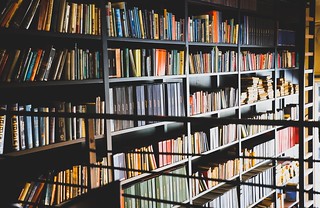 The expensive nature of numismatics is off-putting to those of limited means. However, it doesn't mean you can't get involved if funds are low.
The expensive nature of numismatics is off-putting to those of limited means. However, it doesn't mean you can't get involved if funds are low.
Reading is cheaper than buying. Sure, having a beautiful coin or medal collection taking pride of place in your home is a sight to treasure. But a picture in a book can also paint a thousand words.
Also, while sites offer new and used books, focusing on second hand stuff works out cheapest in the end. An online trip to a charity shop can show you that.
Oxfam is just one location where a surprisingly varied range of texts can be found. As with Amazon, these cover a lot of ground but coins and medals might be one of them.
Add to this the large number of second hand bookstores increasingly reliant on online sales, and there's really no excuse to avoid used volumes. Like coins, books have changed more than a few hands over the years.
Any resource you use must feature a...
COMPREHENSIVE SEARCH
To zero in on a particular type of book, or a certain title and author, you can't do without a decent search engine. Many sites have them, and they're worth their weight in gold.
But there's more. A really good site gives you the option of using keywords to whittle down your final picks. As well as the ability to search by name and ISBN number.
A combination of an expert resource and comprehensive search engine is really all you need when looking for literature of all kinds.
Which brings us to our final tip…
A LOVE OF BOOKS
This short guide shows you not only how to search for numismatic material. Getting into the habit of shopping for specialist books opens up horizons.
Building a book collection is very rewarding. A shelf full of volumes would look great alongside those coins and medals in their cases.
So after looking into the fine art of numismatics, why not spend some on a variety of texts...?
I tried it and sometimes found it difficult to locate books I thought would be easy to find. But the site's availability and pricing data seems valuable. Here's the result of one random pick. -Editor
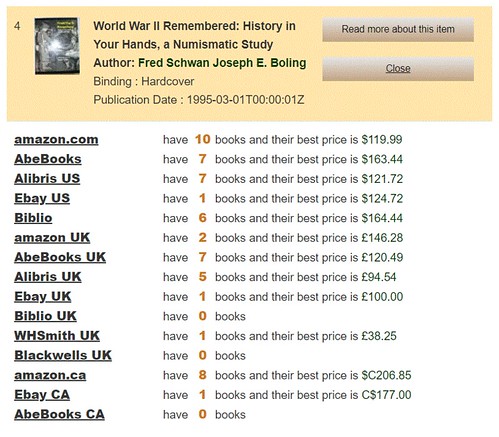
To try your luck, see:
Find Rare & Collectible Books Online
(https://www.usedbooksearch.net/rare-books/)
Photo credits:
https://unsplash.com/photos/qThn_yl0mag
https://unsplash.com/photos/5kXNhroW1_Y
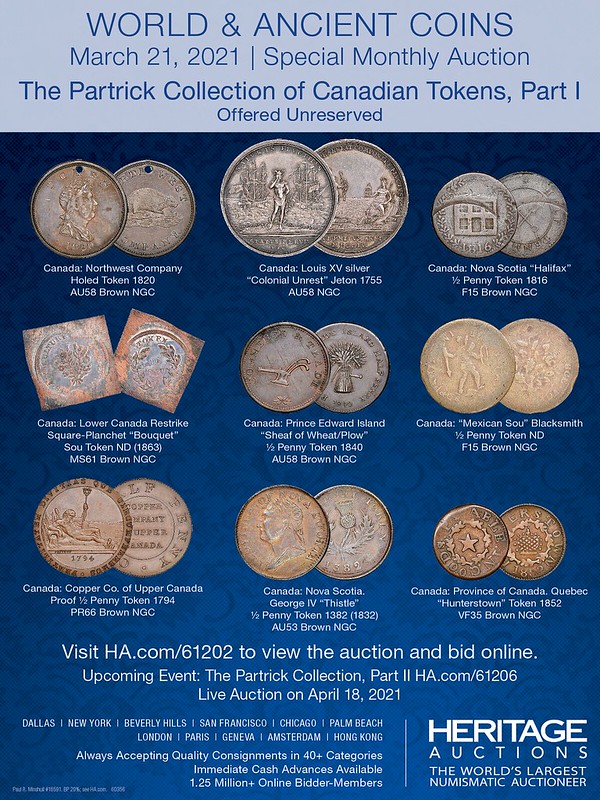
AINA REMOTE SEMINAR ON JEWISH NUMISMATICS
The American Israel Numismatic Association is offering an online seminar on Jewish numismatics. It's free to all and you don't have to be a member. Here's the announcement. -Editor
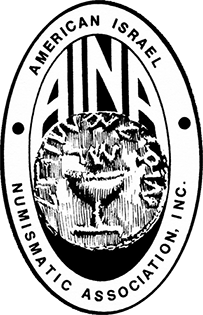 The American Israel Numismatic Association (AINA) presents
our first remote seminar on Jewish numismatics.
The American Israel Numismatic Association (AINA) presents
our first remote seminar on Jewish numismatics.
Since we can't be together for our annual meeting, AINA has decided to bring the experts into your home. This is not a Purim spiel! A reminder will be sent the week of and the day of. The scheduled speakers and topics are:
- Simcha Kuritzky introductory remarks
- David Hendin "Hasmonean Coins"
- Ira Rezak "The Medals of Moses Murro, Bezalel Artist"
- Simcha Kuritzky "The Significance of 314"
There will also be time for questions and answers after each talk, and general Q&A afterwards, particularly if we want to schedule this kind of programming every quarter, every other month, or every month.
Please plan to attend. We expect the entire session to last under two hours, but we can stay on longer if people want.
March 14, 2021 / ראש חדש ניסן
7 PM Israel
5 PM GMT England
1 PM EDT (note change to Daylight Savings Time in the US the night before)
Noon Central
11 AM Mountain
10 AM Pacific
For the Zoom link and passcodes, contact: AmerIsraelCoin@gmail.com -Editor
KAGIN'S MARCH 2021 EDUCATIONAL PRESENTATIONS
Don Kagin submitted this announcement of a group of educational programs to be presented prior to his firm's upcoming auction. Sounds great - mark your calendars. -Editor
EDUCATIONAL PRESENTATIONS TO BE OFFERED BY KAGIN'S AUCTION MARCH 11-12
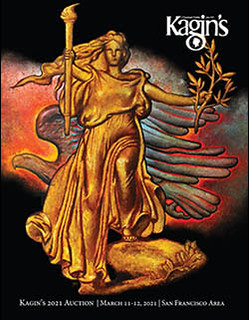 Unfortunately the ANA National Money Show had to be cancelled, but Kagin's Auctions will be offering free educational presentations prior to three of their auction sessions. To ensure that the auction is not delayed, all presentations have been prerecorded.
Unfortunately the ANA National Money Show had to be cancelled, but Kagin's Auctions will be offering free educational presentations prior to three of their auction sessions. To ensure that the auction is not delayed, all presentations have been prerecorded.
On Thursday, March 11 at 3:45 PM (Pacific): Hobo Nickels with Candace DeMarco Kagin.
On Thursday, March 11 at 7:30 PM (Pacific): California Fractional Gold Coins with Robert D. Leonard and Matt O'Connor, son of collector William C. O'Connor.
On Friday, March 12 at 9:30 AM (Pacific): Primitive/Odd & Curious Money with Robert D. Leonard and Charles J. Opitz.
In each case, the auction will begin shortly after the educational program concludes.
Anyone is welcome to view these educational programs by visiting auctions.Kagins.com. No registration is required. For auction information, contact info@Kagins.com or call 888-8KAGINS (852-4467).
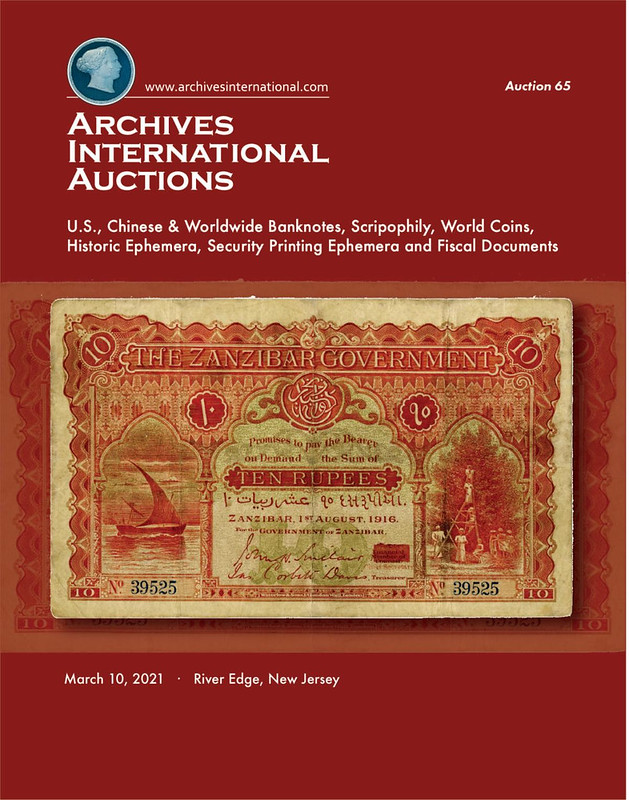
THE 1455 CALAISIENNE MEDAL OF CHARLES VII
Dr. Jonas Emmanuel Flueck of Lugdunum GmbH produced a nice 10-minute video about one of the highlights of the firm's late Spring 2021 auction in Solothurn, Switzerland. Check it out! -Editor
An exceptional medal from the end of the Hundred Year's war
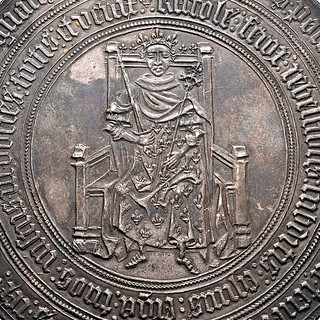 The Calaisienne is an exceptional large silver medal minted in 1455 by the French King Charles VII. It commemorates the French Victory of the Hundred Years' War and the following expulsion of the English from the French territory.
The Calaisienne is an exceptional large silver medal minted in 1455 by the French King Charles VII. It commemorates the French Victory of the Hundred Years' War and the following expulsion of the English from the French territory.
It can be seen as a medal of honour given by the King Charles VII to its most loyal knights for their bravery during the last and most epic battles of the Hundred Years War
This video presents the characteristics of this medal, like its iconography, its rarity, its historical and numismatic importance, its artistic merit and symbolic power as well as its prestigious provenance.
This medal is part of a small group of exceptional medals that have been consigned to Lugdunum and will be offered for sale in our coming auction, taking place in late Spring 2021.
To watch the video, see:
https://www.lugdunum-numismatik.com/en/calaisienne
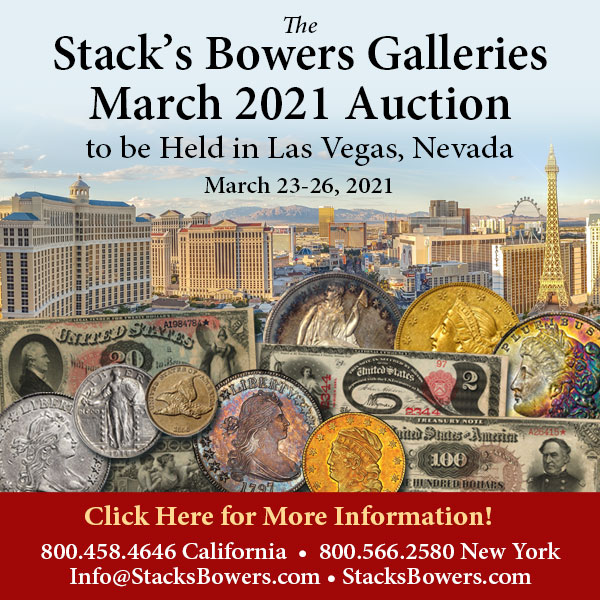
NUMISMAGRAM SELECTIONS: MARCH 2021
Jeremy Bostwick at Numismagram passed along these highlights from his most recent addition of new tokens and art medals to his website. One will notice a particular focus upon aviation-themed types—most of which feature a zeppelin—as well as medals drawing inspiration from older coin designs. There are also some rather interestingly engraved pieces, ranging from love to satire and military. To view all of these new items, please visit numismagram.com/inventory. -Editor
101467 | ANCIENT INSPIRED Roman Empire (Germany). Domitian silver Medal.
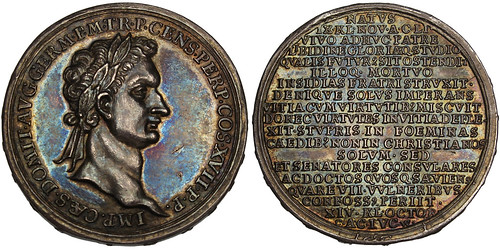
Issued 1696 (32mm, 14.76 g, 12h). By C. Wermuth. IMP • CÆS • DOMIT • AVG • GERM • P • M • TR • P • CENS • PERP • COS • XVII • P • P •, laureate head right / Biographical inscription in 19 lines. Edge: REGNVM FALLAX BONVM. Bürchner 13; Forrer VI, 444. Choice Mint State. Deep gunmetal gray surfaces, with a good deal of iridescence and underlying luster. Very rare and highly attractive. Compare to a similar example that realized a hammer of €750 in Numismatica Ars Classica 53 (7 November 2009, lot 684) and then realized a hammer of €950 in Gorny & Mosch 221 (12 March 2014, lot 3371). $695.
Medalist Christian Wermuth produced a series of portrait medals chronicling the imperial figures of the Roman Empire as well as those of the later Holy Roman Empire. Featuring a classical bust and lines of biographical text on the reverse, this issue celebrates Domitian, the younger son of Vespasian, who ruled from C.E. 81-96. An autocrat who was the opposite of his elder brother and predecessor, Titus, he was assassinated by court officials and would be the final member of what Suetonius described as 'the Twelve Caesars.'
Nice. I'd never seen this medal before. -Editor
To read the complete item description, see:
101467 | ANCIENT INSPIRED. Roman Empire/Germany. Domitian silver Medal.
(https://www.numismagram.com/product-page/101467)
101513 | AUSTRIA. Leopold I/University of Innsbruck silver Medal.
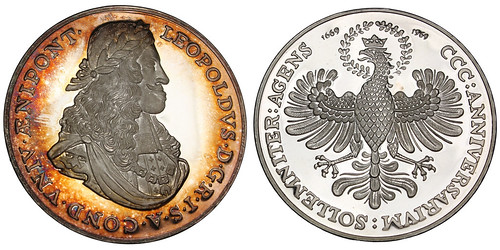
Issued 1969. Commemorating the 300th anniversary of the founding of the university (43mm, 27.86 g, 12h). LEOPOLDVS • D • G • R • I • S • A • COND • VNIV • ÆNIPONT •, laureate, draped, and armored bust right, wearing Collar of the Order of the Golden Fleece / CCC : ANNIVERSARIVM : SOLLEMNITER : AGENS, crowned imperial eagle facing, with head left and wings spread. Edge: BRIXLEGGER AUSBEUTE [axe & hammer] BRIXLEGGER AUSBEUTE [axe & hammer] 925. Gem Mint State. Exceedingly brilliant and prooflike, with highly frosted devices and some alluring burnished toning on the obverse. $225.
Exhibiting the effects of the 'Habsburg jaw,' Leopold was Holy Roman Emperor from 1658-1705 and the product of many generations of close familial marriages. As such, his lower lip, along with that of many in the Habsburg line, was rather pronounced, and numismatics offers a great glimpse into the hereditary defect. He is maybe most known in the coin collecting community by the unfortunate appellation as 'the Hogmouth.'
I was born duck-footed, but that didn't stop my gradeschool classmates from calling me "Pigeon Toes". Hooray for Leo the Hogmouth. -Editor
To read the complete item description, see:
101513 | AUSTRIA. Leopold I/University of Innsbruck silver Medal.
(https://www.numismagram.com/product-page/101513)
101544 | FRANCE. Montgolfière and Charlière Balloons silver Stamp Dispenser Lid.
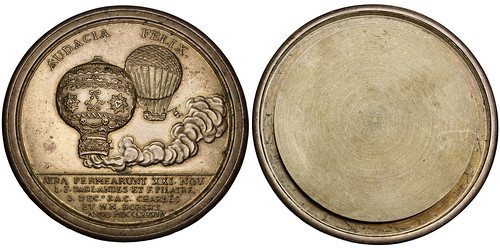
Issued circa 1950 (53mm, 70.28 g). After A. Pajou. AUDACIA FELIX, Montgolfière (hot air, in foreground) and Charlière (hydrogen, in background) balloons in flight; in four lines in exergue, AERA PERMEARUNT XXI. NOV. / L. F. DARLANDES ET F. PILATRE / I. DEC. J. A. C. CHARLES / ET M. N. ROBERT / Blank, with grooved rim for placement onto the stamp-dispensing body. Edge: Plain. Cf. Malpas 6 (for prototype). Essentially as issued. Lightly toned, with a few scattered spots. An interesting form of exonumia after this popular aviation type. $195.
Though airships such as the first planes and Zeppelins wouldn't make their appearance until the beginning of the 20th century, the concept of conquering the power of flight had been a constant challenge, and one that was finally achieved through the manned flights—each in 1783 in France—by Jacques Charles and the Robert brothers (in gas balloon, referred to as the "Charlière") and the Montgolfier brothers (Joseph-Michel and Jacques-Étienne Montgolfier; in a hot air balloon, referred to as the Montgolfière).
If you've never taken a ride in a hot air balloon, put it on your bucket list. Great fun. -Editor
To read the complete item description, see:
101544 | FRANCE. Montgolfière and Charlière Balloons Stamp Dispenser Lid.
(https://www.numismagram.com/product-page/101544)
101543 | GREAT BRITAIN & SOUTH AFRICA. Second Boer War satirical engraved copper Penny
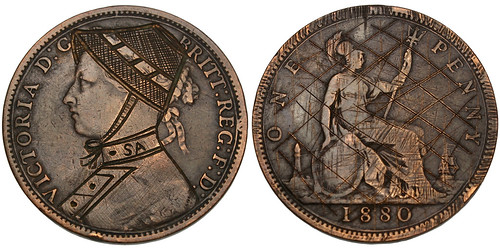
(30mm, 9.11 g, 12h). 1880 London mint Victory penny, with engraving upon obverse and reverse: Bonnet and military jacket, with "SA" upon collar / Cross-hatching across Britannia. Edge: Plain. Cf. SCBC 3954 (for host coin); cf. KM 755 (same). Engraving: Extremely Fine; Host coin: Very Fine. $225.
Though we've had one of these in the past and presented it as a women's suffrage theme, new evidence has been discovered pointing toward their actual meaning: a small handful of Victorian pennies such as these were altered during the Second Boer War in South Africa. Boer soldiers wanted to satirize the British empress and presented her in a convict uniform as indication of her status as a prisoner of war. On some examples, an S (for "South Africa") is present, while, on others (as here), an SA is present. Further, this example features additional engraving on the reverse—a cross-hatching pattern indicating that Britannia herself is encaged and in prison. A very interesting and rare piece, with only about 15 examples known.
Cool satirical piece. -Editor
To read the complete item description, see:
101543 | GREAT BRITAIN & SOUTH AFRICA. Second Boer War satirical copper Penny.
(https://www.numismagram.com/product-page/101543)
101551 | GREAT BRITAIN & INDIA. Alfred C. Bullymore engraved silver WWI ID Badge or Memento
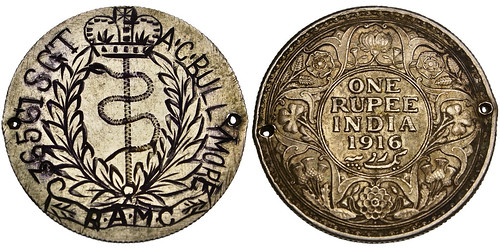
(25mm, 4.04 g, 12 h). 1916 Indian rupee, with engraving upon obverse: rudimentary emblem of the Royal Army Medical Corps (serpent-entwined staff surmounted by crown and within wreath) between "36561 SGT A • C • BULLYMORE;" "R•A•M•C" on banner below. Edge: Reeded. Cf. KM 524 (for host coin). Engraving & host coin: Extremely Fine. Lightly toned; holed to left and right for wearing. $325.
Alfred Cleaveland Bullymore was born ca. July–September 1886 in Thrapston in Northamptonshire, with census records showing him as a servant in the Blunsom household in nearby Kettering in 1901, and then as a boarder and hosiery assistant in London a decade later. He eventually found himself serving in World War I, at which point he was listed as an acting sergeant in 1914 with the Royal Army Medical Corps (service number 36561). Following the war, Bullymore appears to have relocated to Birmingham, where he married Mary A. Thursfield in 1921 (in Aston) and passed away in 1957 (in Sutton Coldfield).
Interesting medical trench art piece. -Editor
To read the complete item description, see:
101551 | GREAT BRITAIN & INDIA. Alfred C. Bullymore silver WWI ID Badge.
(https://www.numismagram.com/product-page/101551)
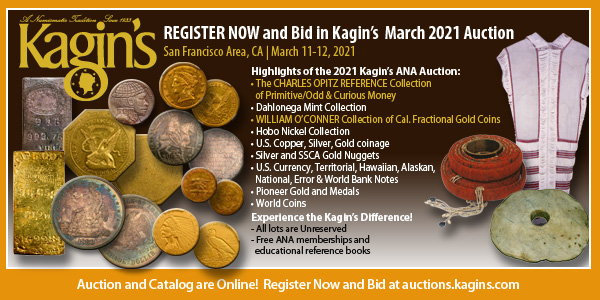
NUMISMATIC NUGGETS: MARCH 7, 2021
Here's a selection of interesting or unusual items I came across in the marketplace this week. Tell us what you think of some of these. -Editor
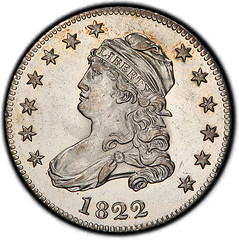
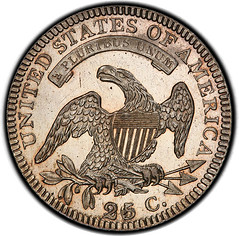
B-2 ,R.5 *** Blundered die with Denomination error is one of the most important and rare coins in this popularly collected set. While most are well-worn AG to VG only a handful of truly collectible examples exist. Remarkably, all population entries above XF40 are 1. This amazing coin is fully proof-like and faces up like a proof. At one point it was carried as proof in the condition census. There is one 61 and one 63 that it can be compared to but both coins have harsh digs and scratches that would lead to disqualification by advanced collectors. A rare opportunity.
From Harry Laibstain Rare Coins. Wow - great coin! -Editor
To read the complete item description, see:
1822 25C 25/50C B-2 ,R.5 *** PCGS AU58+
(http://hlrc.com/Inventory/CoinViewer?id=870080001&c=23)
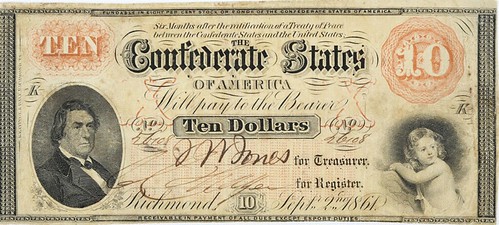
1861 $10 CONFEDERATE NOTE T-24
Robert M.T. Hunter at left
Provenance: A Virginia Collector
From the Brunk Auctions March 12-13 2021 sale of "a Virginia Collection of Coins and Currency." -Editor
To read the complete lot description, see:
1861 $10 CONFEDERATE NOTE T-24
(https://brunkauctions.com/lot/1861-10-confederate-note-t-24-4056843)
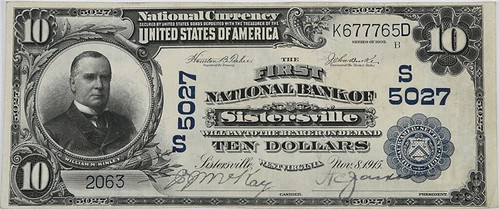
1902 $10 FIRST NB SISTERSVILLE, WV
Fr. 632, charter #5027
Provenance: A Virginia Collector
Also from the Brunk Auctions March 12-13 2021 sale of "a Virginia Collection of Coins and Currency." I'd never heard of Sistersville, West Virginia! -Editor
To read the complete lot description, see:
1902 $10 FIRST NB SISTERSVILLE, WV
(https://brunkauctions.com/lot/1902-10-first-nb-sistersville-wv-4056564)
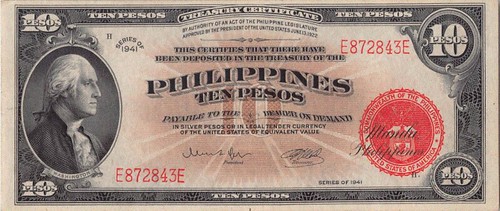
Philippines 1941 (ND 1944) P-92c PMG Choice UNC 64 EPQ 10 Pesos "Naval Aviators' Issue"
Very rare "Naval Aviators" issue, especially at this grade level. The serial number identifies this as one of just 20,000 notes of this denomination which were part of package given to Naval airmen before their missions over the Philippines during World War II. Very difficult to find in original uncirculated condition as seen here, this one is surpassed by just a single example in the PMG population report. Important opportunity for the World War II or Philippines specialist.
This one has already sold in the last World Banknote Auctions sale. Great item - I wasn't aware of these. -Editor
To read the complete lot description, see:
Philippines 1941 (ND 1944) P-92c PMG Choice UNC 64 EPQ 10 Pesos "Naval Aviators' Issue"
(https://worldbanknoteauctions.com/lots/view/4-1QXMB8/philippines-1941-nd-1944-p-92c-pmg-choice-unc-64-epq-10-pesos-naval-aviators-issue)
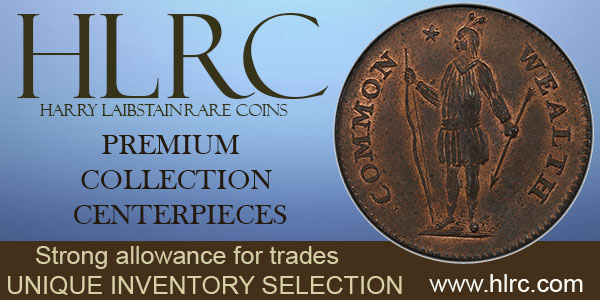
RARE HAWAIIAN CURRENCY IN KAGIN'S AUCTION
Here's a press release about the Hawaiian paper money offered in the upcoming Kagin's sale. Rare and interesting pieces. -Editor
RARE HAWAIIAN CURRENCY FEATURED IN KAGIN'S AUCTION
Offered in Kagin's March 12th 2021 auction is "The Aloha Hawaiian Collection" including high-grade examples of the earliest and rarest Hawaiian scrip currency. Each note is graded by Numismatic Grading Corporation and listed in Hawaiian Money by Donald Medcalf and Ronald Russell.
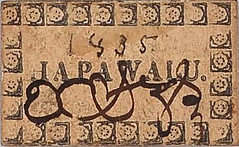
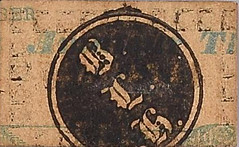
Hawaii's sugar industry started in 1835 on the Island of Kauai. Ladd & Company signed a lease with King Kamehameha III and issued scrip in 1837 to pay workers. The company went bankrupt and the Government seized their assets. The finer of just two reported known notes, a PMG CU-63 $1/8th HAPAWALU 2PE-1 last sold in the Superior 2/75 sale of the incomparable A.J. Ostheimer Collection begins the offering.
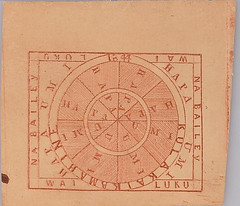 The 1844 WAILUKU FEMALE SEMINARY 1 HAPAUMI (approx. 10 cent) note is another seldom seen or offered note. The Seminary opened July, 1837 in Wailuku, Maui and was dedicated to teaching domestic arts to native girls. Missionaries imported a printing press to Honolulu in 1820 and in 1833 the press was shipped to the Lahainaluna Seminary. At the time there was an acute shortage of coins to pay the male employees so in 1844 they printed scrip in red on thin cardboard. The finest of only 5-6 known, graded PMG CU-63, is part of the Aloha Collection.
The 1844 WAILUKU FEMALE SEMINARY 1 HAPAUMI (approx. 10 cent) note is another seldom seen or offered note. The Seminary opened July, 1837 in Wailuku, Maui and was dedicated to teaching domestic arts to native girls. Missionaries imported a printing press to Honolulu in 1820 and in 1833 the press was shipped to the Lahainaluna Seminary. At the time there was an acute shortage of coins to pay the male employees so in 1844 they printed scrip in red on thin cardboard. The finest of only 5-6 known, graded PMG CU-63, is part of the Aloha Collection.
An additional $200 of these notes were made to order for sugar manufacturer, Edward Bailey and were counter-stamped "Edward Bailey". A PMG VF-35 specimen is in the unreserved auction. Both notes are extremely rare.
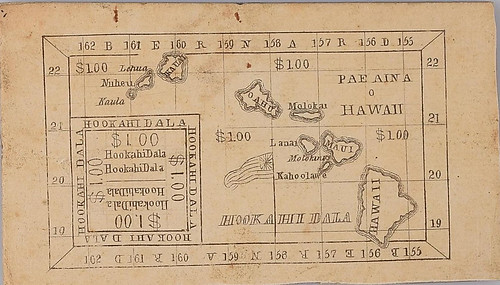
Highlighting this collection is the Unique 1844 "Bernard" Money note which according to the cataloger, is its only public appearance in over a half century. John Bernard, and Englishman, Godfrey Rhodes, leased 150 acres of land in Hanalei, Kauai, from the Hawaiian Government. Like Bailey, Bernard had $850 worth of notes printed by the Lahainaluna Seminary who counter-stamped "Bernard" on them. A single known AU-50 HOOKAHI DOLLAR is offered.
A six-note set of LAHAINALUNA SEMINARY CURRENCY is offered provisionally in six lots and then as a single lot. It is believed by the cataloger to possibly be the finest known cut sheet.
Additional Hawaiian currency, coins and medals and U.S. currency, encased postage stamps and more can be viewed on-line at www.Kagins.com.
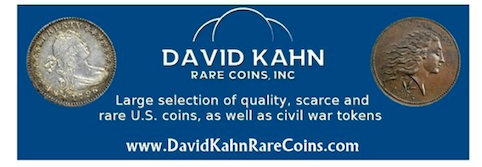
UNIVERSITY GIVEN COINS SEIZED AT BORDER
Anne Bentley passed along this article about the recent seizure of ancient coins at the US-Canada border. -Editor
Dozens of ancient coins seized in 2017 at the U.S.-Canada border in Blaine have been transferred to the University of Washington to be studied, authorities said.
"These 51 Greek Hellenistic and early Islamic coins had no legal providence associated with them to validate if they were lawfully acquired and imported to the United States," said a statement by Homeland Security Investigations Pacific Northwest, which has the authority under federal law to lead investigations involving illegal importation and distribution of cultural property and art.
Agency documents on the coin transfer said a suspect returned to the U.S. in 2017 through the Blaine border crossing after he was refused entry into Canada, The Bellingham Herald reported Thursday. Customs and Border Protection searched the suspect's vehicle and discovered the coins, which were similar to ones found on the Red List of Afghanistan Antiquities at Risk, documents said.
Homeland Security Investigations agents determined the suspect, who was not identified, did not have documentation that he owned the coins, which showed signs of Bronze Disease — a form of corrosion that is an indication the coins had illegally been taken from the ground. He later signed an agreement to abandon the coins.
No government representatives from Afghanistan or any other countries claimed the coins, so they were legally forfeited to the U.S. government.
The Curator of the Special Collections Center of the University of Washington Libraries petitioned in 2019 to the Border Patrol to donate the coins. The coins were transferred to the university on Thursday.
If bronze disease and being "similar" to coins on some list is a crime, a lot of collectors could be on Death Row. While this group of coins may well have had dodgy origins, the stated criteria for seizure seems equally dodgy. -Editor
To read the complete article, see:
University to study ancient coins seized at US-Canada border
(https://apnews.com/article/canada-bellingham-washington-united-states-c51f3dd674d5365e3a8dbd812883f7c5)

THE UNIQUE BRASHER HALF DOUBLOON
Bob Leonard submitted this piece on the Brasher Half Doubloon in the National Numismatic Collection at the Smithsonian Institution. Thanks! -Editor
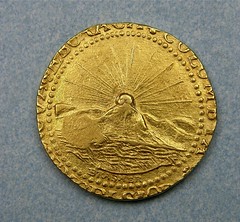
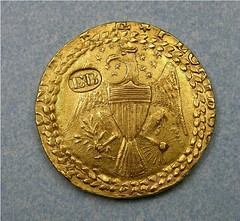
The Unique Brasher Half Doubloon
I got my copy of Michael Carabini and Adam Crum's The Brasher Doubloon: America's First Gold Coin recently, and see that Kenneth Bressett was offered the unique half doubloon in the early 1950s but had to pass on account of price. Curiously, this seems to be the only mention of the half doubloon in the entire book, perhaps because it is noncollectible. There is an interesting story related to this coin—documented in the Newman Numismatic Portal—that deserves to be resolved.
But first, let's look at its apparent pedigree, based on Douglas A. Winter's article in Coin World, Aug. 17, 1983, ads for it, material in the NNP, Harvey Stack's published recollections, and what I could find out about E. Arthur Ball and Col. Green:
Smithsonian Institution, June 13, 1968 to date; Josiah K. Lilly Estate; Josiah K. Lilly Collection, circa 1956/1964 - May 5, 1966; Stack's (perhaps as agents); unknown intermediaries; E. Arthur Ball Estate, Muncie, Indiana, May 1948 – early 1950s; E. Arthur Ball Collection, 1946 – April 16, 1947; Stack's, 1943 – 1945 or later (offered in The Numismatist Feb. 1946, p. 200, at $10,000 "Uncirculated"); Col. E. H. R. Green Estate (Chase National Bank, Executor of U.S. Gold Coins, June 1936 – 1943); Col. E. H. R. Green Collection early 1930s – June 8, 1936; F. C. C. Boyd, 1925 – early 1930s; [Elmer Sears offered to J. W. Garrett April 23, 1925 for $7500, but declined May 4, 1925; previously offered to Waldo Newcomer, who also declined.]; discovered by David Proskey circa 1925? ("around 1928" per Numisma, March-April, 1957) in a lot of South American gold coins; "lady" seller to David Proskey. (Note: The NNP gives the page number of the Numismatic Scrapbook Magazine ad for May 1948 as 64, while it is actually 486; apparently it is the 64th page in the May issue, and the scanning software simply renumbers with each issue.)
I am now convinced that the Brasher half doubloon is perfectly legitimate, though an odd way for Brasher to inspire confidence in his doubloons. Everyone who examined it—Sears, Bressett, Bowers—has remarked that it is struck on a thinner planchet, in addition to being somewhat smaller in diameter. Sears gave its weight as 196.7 grains, compared to 406-407 grains for a full doubloon. Perhaps it was intended to be used as jewelry; after seeing it, Bowers mentioned that it has filing and cutting on part of the edge.
Despite having a pedigree almost a century old, the half doubloon has at times been condemned by both Newman and Bressett, among others. This is because of a tale told by long-time Chicago Coin Club member James L. Doak beginning in the late 1960s; I heard a version of it from him at the Chicago Coin Club meeting March 10, 1971. At that time Doak said that around 1949 he had seen a Brasher doubloon with a large hole near the rim which had come out of the Ball Estate; it was offered to him (and other dealers), but he refused because of the severe damage. He said that it was then sent to a dealer in New York, and the "half doubloon" later surfaced, to be was acquired by Stack's for the Lilly Collection. Doak said that he was convinced that the dealer who bought the mutilated doubloon had cut it down and sold it for a half doubloon.
Doak had told a similar story earlier; Eric Newman summarized a slightly different version in a letter to Lee Hewitt (president of the Chicago Coin Club in 1971) August 15, 1969, archived in the NNP. In this account, the rim damage was a heavy test cut, and it was sold to a man named Frank Smith. But despite many enquiries, Eric was never able to obtain confirmation of Doak's story.
And he never could have: the half doubloon was known in 1925 and illustrated in 1946, long before Doak examined the coins in the Ball Estate. Probably Doak confused the half doubloon he saw there with a different coin; the Ball Estate must have contained another early gold coin that was holed or mutilated and he conflated the two.
(Without the resources of the NNP, it would have been impossible to reconstruct this pedigree and confirm the authenticity of the Brasher half doubloon. Thanks!!)
To read the Smithsonian entry for the Brasher Half Doubloon, see:
Brasher Half Doubloon, United States, 1787
(https://www.si.edu/object/brasher-half-doubloon-united-states-1787:nmah_1095000)
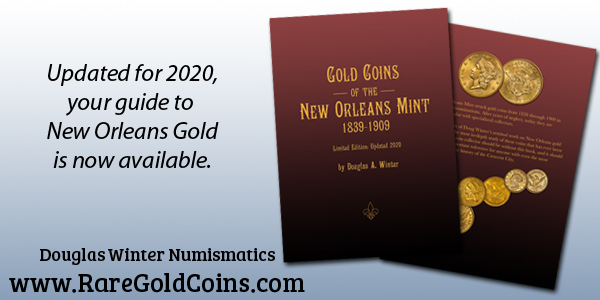
SRI LANKA TO REPLACE NOTE WITH NEW COIN
Dr. Kavan Ratnatunga writes:
"I wrote this article which appeared today. I like the neat packaging of the coins which avoids bag marks and also useful for collectors."
Thanks. See the complete article from The Sunday Times online - here's an excerpt. -Editor
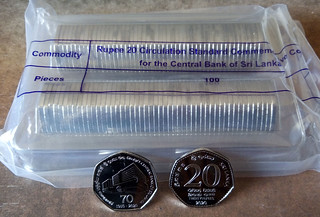 On March 3, the Central Bank (CB) issued into circulation a new Rs.20 commemorative coin to mark the 70th Anniversary of the CB. Five million coins have been minted by China Mint in Nickel-plated steel similar in all other respects to the limited edition of 3000 commemorative coin minted in Aluminum bronze that was issued on January 1 in a presentation box and sold for Rs.1300 each from the CB Museum. These circulation coins will be only available through commercial banks since the CB cash counter has been closed since the start of the pandemic.
On March 3, the Central Bank (CB) issued into circulation a new Rs.20 commemorative coin to mark the 70th Anniversary of the CB. Five million coins have been minted by China Mint in Nickel-plated steel similar in all other respects to the limited edition of 3000 commemorative coin minted in Aluminum bronze that was issued on January 1 in a presentation box and sold for Rs.1300 each from the CB Museum. These circulation coins will be only available through commercial banks since the CB cash counter has been closed since the start of the pandemic.
This is the first time a Rs. 20 coin was minted and is expected to replace the Rs.20 currency note shortly. The Rs.10 note last printed with a 2006 date was replaced with a coin in 2009. Only time will tell if these Rs.20 coins will circulate, for the higher denomination coin to become familiar to the general public. Many of the CB commemorative coins are unfortunately not seen much in circulation. I suspect that the CB vault issues the regular issue in preference to the commemorative issue. This also makes it difficult for coin collectors to find these coins in circulation, and often only seen, sold by dealers, a few times the face value.
To read the complete article, see:
New Rs. 20 coin to replace Rs.20 note
(http://www.sundaytimes.lk/210307/business-times/new-rs-20-coin-to-replace-rs-20-note-434302.html)
IMITATION SOVEREIGNS & HALF SOVEREIGNS
Further to the earlier E-Sylum article on Imitation Guineas and Half-Guineas, author Martin Warburton has submitted this note on the companion publication listing. Thank you! -Editor
TO HANOVER counters satirize the Duke of Cumberland's ‘departure' to Hanover. Although British monarchs from George I were also rulers of Hanover, Queen Victoria was barred under Salic law from succeeding to the Kingdom of Hanover, so the succession went to the nearest male heir, the unpopular Ernest Augustus, Duke of Cumberland.
The counters depict the Duke riding past a dragon (parodying St. George and the dragon) with the legend To Hanover.
The obverse usually depicts a young head portrait of Queen Victoria facing left with legends such as Victoria Queen of Great Britain, H.M.G.M. Queen Victoria, Victoria Regina etc. In a few cases the manufacturer's initials appear on the truncation. The counters are usually dated from 1837 to 1869 with only a few dated after that. Most of those dated after 1840 probably indicate the actual date of issue. A significant number have a fictitious date of 1830 and many of these, including those with the mis-spelling Quen, were made by the Nuremberg firm L C Lauer. In addition, some unusual and advertising pieces exist.
The vast majority of the To Hanover counters are sovereign size with only about ten per cent half sovereign size. The half sovereign denomination was served by another popular series of counters at the time, the Prince of Wales Model counters (see below).
However, To Hanover counters bore some similarity to gold sovereigns, especially after the reintroduction of the George and dragon reverse in 1871. This led to many prosecutions both in respect of their manufacture and for passing them as gold coins to unsuspecting victims. It was not, however, illegal to sell them (for an innocent purpose) until the Counterfeit Medal Act of 1883. This prevented the sale of "Medals" resembling current coin and led to the re-appearance of the spade guinea series of counters (see the article on imitation guineas in E-Sylum 29 November 2020).

PRINCE OF WALES MODEL SOVEREIGN & HALF SOVEREIGN counters were first issued shortly after Edward, first son of Queen Victoria, became Prince of Wales in late 1842, a month after his christening. He held the title of Prince of Wales for 59 years before ascending the throne as Edward VII in 1901.
The counters were extremely popular and continued to be issued by various manufacturers until the 1870's. About 150 varieties of the Prince of Wales Model counters are known and about ninety per cent are half sovereign size; to complement the ninety per cent of sovereign sized To Hanover counters.
The normal obverse is a young head portrait of Queen Victoria with legends such as Victoria Regina or variations of Victoria Queen of Great Britain.
There are three main reverse types -

1. The Prince of Wales emblem of three plumes and a coronet enclosed by a garter inscribed Honi Soit Qui Mal Y Pense with no outer legend.
2. Three plumes and a coronet with a ribbon on either side inscribed Ich and Dien, enclosed by a crowned circular frame. The circular frame is usually made up of two or three concentric circles with seven or eight ornaments or blocks. The outer legend is The Prince Of Wales Model (Half) SovRN.
3. The Prince of Wales on horseback enclosed by a crowned garter inscribed ICH DIEN, with outer legend of The Prince Of Wales Model (Half) SovRN
As with To Hanover counters, the Counterfeit Medal Act of 1883 effectively put an end to the sale of Prince of Wales counters.
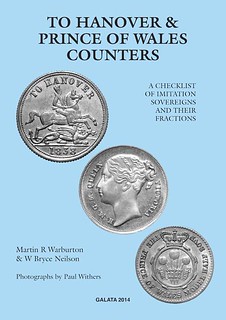 An illustrated checklist of both To Hanover and Prince of Wales counters was published in 2014 by Galata Print in the UK: - ‘To Hanover & Prince of Wales Counters' by Martin R Warburton & W Bryce Neilson.
An illustrated checklist of both To Hanover and Prince of Wales counters was published in 2014 by Galata Print in the UK: - ‘To Hanover & Prince of Wales Counters' by Martin R Warburton & W Bryce Neilson.
For more information, or to order, see
To Hanover & Prince of Wales Counters. A Checklist of Imitation Sovereigns and their Fractions
(https://www.galata.co.uk/to-hanover-prince-of-wales-counters-a-checklist-of-imitation-sovereigns-and-their-fractions)
To read the earlier E-Sylum article, see:
IMITATION GUINEAS AND HALF-GUINEAS
(https://www.coinbooks.org/v23/esylum_v23n48a12.html)
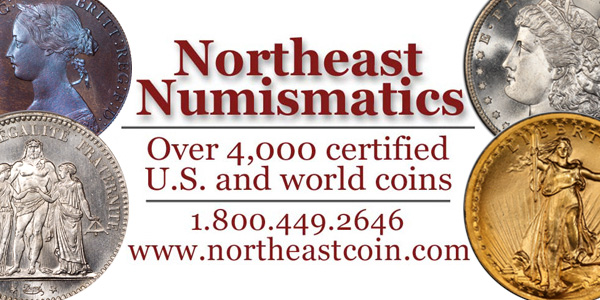
ORELL COLORED SCHOOL MEDAL
I flat ran out of time last week, but wanted to wrap up John Kraljevich's Black History Month articles from Facebook. This one features a medal for a student of the Orell Colored School in Louisville, Kentucky. -Editor
This morning, I woke up to an excited press release from Colonial Williamsburg. Researchers there have identified Virginia's oldest extant school for African-American children. Opened in 1760 at the suggestion of Benjamin Franklin, the Bray School was one a series of schools opened in the American colonies at the behest of a group called "The Associates of Dr. Bray." Thomas Bray, an English cleric, founded two literacy organizations, one called the Society for Promoting Christian Knowledge, the other the Society for Propagation of the Gospel in Foreign Parts. Bray's followers attempted to open schools for enslaved children in Georgia and South Carolina but, entirely unsurprisingly, their plans were not welcomed.
Franklin became a supporter of Bray's ideas and helped to open a school in Philadelphia in 1757. Encouraged by its success, he prodded authorities to open similar schools in New York, Rhode Island, and Virginia. Virginia opened two Bray Schools, one in Williamsburg in 1760 and one in Fredericksburg in 1765. While the Fredericksburg school lasted just five years (and was unpopular with local enslavers), the one in Williamsburg remained open until 1774.
And today, Colonial Williamsburg announced that the structure still exists (on the campus of the College of William and Mary) and would be moved to Williamsburg's historical area, closer to where it was initially, for renovation and historical interpretation.
The medal illustrated below was awarded by the Louisville Times to a Wilhelm Rowan of the Orell Colored School in Louisville, Kentucky. Orell made the papers in 1933, six years after this medal was presented "for effort," when 15-year-old Coy Miller won the county spelling bee. Young Wilhelm doesn't turn up in census records under the name engraved on this medal, but I fear he is the William Rowen, born 1915, who is found in the 1940 census as an inmate at the Jefferson County Jail. He would have been 12 when he received this medal for academic excellence. For reasons unknown, he dropped out in 8th grade. And at age 25, he was locked up.
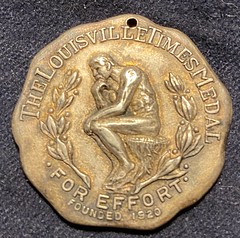
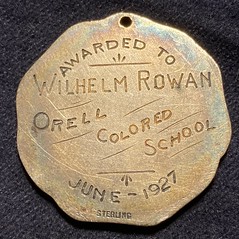
William Rowen's story wasn't unusual then, and it isn't unusual now.
The Mullins School in Marion County, South Carolina was a Rosenwald school, funded with donated money from a Northern philanthropist. First constructed in 1924, then rebuilt with Rosenwald money in 1953, the Mullins School was known as Palmetto High School when it finally integrated in the 1970-71 school year, like schools all over South Carolina, more than 15 years after the Brown v. Board of Education ruling. Black high schools statewide were turned into middle schools when the student bodies of the two high schools merged, a tacit admission that their facilities were subpar. When towns like Mullins had two high schools that merged in 1970-71, the new single high school was typically about the same size as the previous segregated Black high school, as white parents pulled their children from public schools to enroll them in private "segregation academies" which sprung up during the Civil Rights Era program of "massive resistance" to segregation.
To read the complete article, see:
Black History Month, 2021. Day 25.
(https://www.facebook.com/john.kraljevich/posts/10226170663592876)
Here are some additional posts in John's series. -Editor
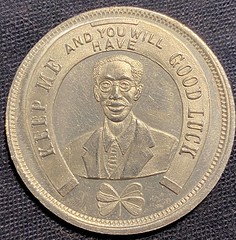
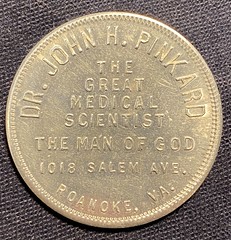
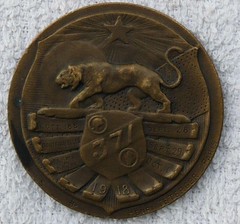
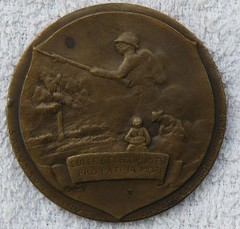
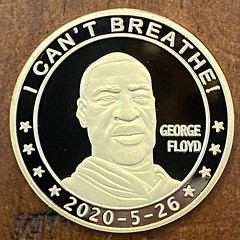
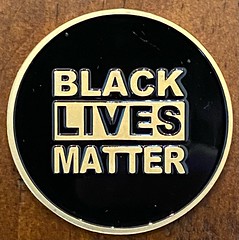 s
s
To read the complete articles, see:
Black History Month, 2021. Day 21.
(https://www.facebook.com/john.kraljevich/posts/10226137351520095)
Black History Month, 2021. Day 22.
(https://www.facebook.com/john.kraljevich/posts/10226152035607188)
Black History Month, 2021. Day 24.
(https://www.facebook.com/john.kraljevich/posts/10226161964735410)
Black History Month, 2021. Day 26.
(https://www.facebook.com/john.kraljevich/posts/10226187040162280)
Black History Month, 2021. Day 28.
(https://www.facebook.com/a.kraljevich/posts/10226191384110876)
To read the earlier E-Sylum articles, see:
1971 BLACK AMERICAN DAY MEDAL
(https://www.coinbooks.org/v24/esylum_v24n06a33.html)
THE NEW HARLEM OF SEATTLE TRADE TOKEN
(https://www.coinbooks.org/v24/esylum_v24n07a29.html)
THE LIBERIAN EXODUS
(https://www.coinbooks.org/v24/esylum_v24n08a30.html)
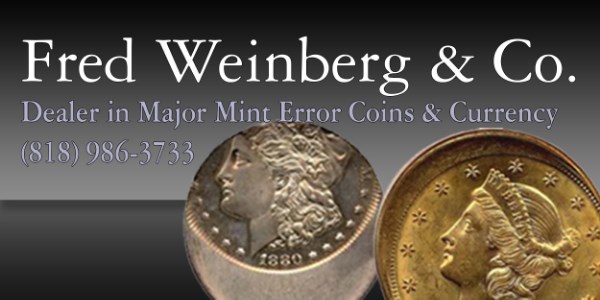
1921-S ZERBE PROOF MORGAN DOLLAR
Here's a group of Heritage press releases about three interesting upcoming offerings. First up - a 1921-S Zerbe dollar. -Editor
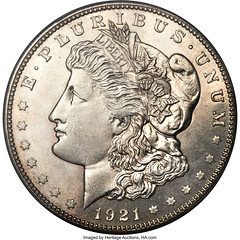
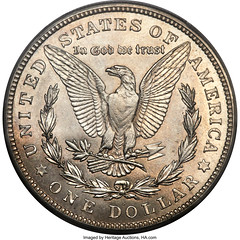
Mysterious Zerbe Proof Morgan Dollar Celebrates 100-Year Anniversary
100 years ago, the 1921-S Zerbe proof Morgan Dollars were struck at the request of prominent numismatist Farran Zerbe. The coins are great rarities in the Morgan dollar series, much more elusive than their Philadelphia counterparts. The official mintage total is unknown, but the most-often quoted figure is just 24 pieces struck. At least five examples of these mysterious coins survive today. PCGS has graded a total of five coins, possibly including some resubmissions, while NGC has not certified any examples of this issue.
Stuart Mosher told the story of the origin of these coins in an article in the July 1955 issue of The Numismatist:
"About 10 years ago, Farran Zerbe, father of the Peace dollar and our first American numismatic missionary, told me an intriguing story regarding a branch mint Morgan dollar issued in proof.
"In 1921 he was in California awaiting the arrival of the dies that were to be used to strike the first Peace dollars at the San Francisco Mint. The Mint phoned him that the dies had arrived and he hastened there to see them put into operation. The new 1921 dies had arrived all right but they turned out to be dies for the old Morgan design which had not been coined since 1904, and not the dies for the Peace dollar which he had worked so hard and long to promote.
"Mr. Zerbe told me that he suggested to the chagrined Mint officials that they could assuage his disappointment somewhat if they would strike off a few Morgan dollars from the new 1921 dies in proof condition. They were happy to oblige and manufactured about two dozen which he bought and later handed out to his various coin collecting friends throughout the country. While I have never seen one of these proofs it is logical to suppose some of them are extant."
Heritage will be offering one of the 5 known examples in April. With 2021 being the 100-year anniversary of these intriguing coins and with the new celebration of the Morgan and Peace Dollar being struck by the US Mint in 2021, the timing seems ideal for this rarity. The example up for bid is graded Specimen 64 by PCGS and verified by CAC.
The last time Heritage offered this coin in 2014, it nearly broke the six-figure mark at $94,000. Place your bets (and your bids) on what it will go for this time:
https://coins.ha.com/itm/morgan-dollars/silver-and-related-dollars/1921-s-1-sp64-pcgs-cac-pcgs-7348-/p/1329-17010.s
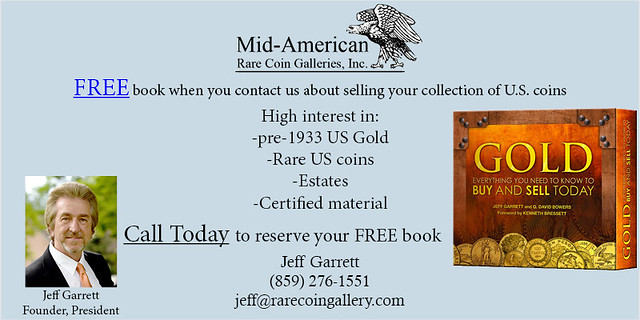
HAWAIIAN STARFISH PLANTATION TOKENS
Here's a Heritage press release about the Hawaiian starfish plantation tokens -Editor
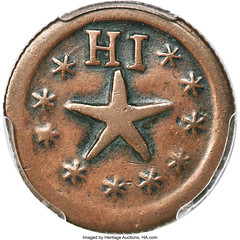
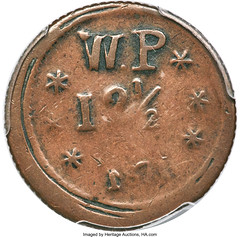
The Story of the Starfish Tokens
At many points in history, tokens have been struck to help fill the void in commerce due to a lack of circulating coinage. Civil War tokens are a famous example and helped everyday people to make the purchases that they needed to, including making change without having to resort to the barter system. Besides Civil War Tokens, another favorite area of American token collecting is the Hawaii issues of the sugar plantations, such as the Wailuku and Haiku plantations. This brings us to the story of the starfish.
Heritage Auctions will be offering an 1871 Wailuku Plantation Token in the April US Coin Auction #1329, graded PCGS XF40. During the 1800s, the Kingdom of Hawaii did not have its own mint or easy access to the metals needed to mint coinage, so they relied upon a ragtag supply of other coins from the Spanish American colonies and the mainland United States to get by. Because this was often not entirely sufficient, some of the sugar plantations started to strike their own charming tokens. These tokens were made in Maui by blacksmiths to be paid out to plantation workers in lieu of Spanish-American coinage. While these tokens have a somewhat homegrown appearance due to not being made in an official mint with fancy machinery, their somewhat crude nature only adds to their appeal to collectors today.
A 1 real token was equivalent to 12 1/2 cents, or one-eighth of a Spanish dollar, the value of a Spanish 1 real piece. By sticking to a system of money that Hawaiians would have been familiar with (the Spanish system), these tokens were easier to understand at the time. They were minted with different starfish designs, categorized today as the "broad starfish" or "narrow starfish" varieties. While this may have occurred by chance at the time, it makes for a fun opportunity to categorize which variety of starfish token--plantation token--that you have in your collection today.
While the plantation tokens were not legal tender, they circulated as money throughout the Hawaiian islands in the late 1800s. They could be redeemed for the merchandise at the company store. By 1880 (another year that these tokens were struck), the Wailuku Plantation employed 160 men and produced 1,500 tons of cane sugar.
The piece that is coming up for bid will likely sell for around $2,000 or so, making this a scarce but also affordable example of financial and Hawaiian history!
See it here:
https://coins.ha.com/itm/coins-of-hawaii/coming-soon-pcgs-600503-/p/1329-41001.s

TWO-TAILED LIBERTY NICKEL BROCKAGE
And here's an interesting error piece I'd never seen before. -Editor
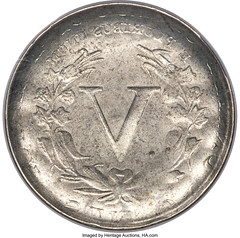
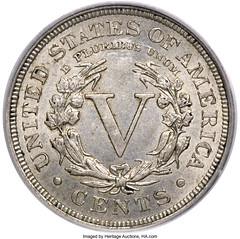
Head or Tails? This is a Two-Tailed Coin Instead
Most times that someone says they have a two-headed coin or a coin with two reverses, it is actually just a "magician's coin," or a replica made by combining two different coins to create the false appearance of something with two obverses or two reverses. Heritage Auctions will be offering a coin that truly does have two tails sides in Sale 1329: a fascinating brockage error!
A brockage is an uncommon mint error that can occur when an already-minted coin sticks to the die and impresses onto another blank that has not yet been struck. This results in a fascinating error where one side of the coin has the normal design and the other side has a mirror image of the same design impressed upon it. The coin will have either two fronts (obverses) or two backs (reverses), with one being a mirror image of the other.
In this case, the brockage in question is of a Liberty Nickel, which was minted from 1883 to 1912. While we cannot be certain of the date because this coin shows the back side on both sides (and the date would have been on the front), we know that it would have been minted somewhere between the 1880s and 1912. This piece was struck between a reverse die and another struck Liberty nickel, leaving a mirrored, incuse impression of the reverse of another coin in the place of an obverse design. It has a big V on both sides, which is the Roman numeral representing "5 Cents."
Brockages on Liberty Nickels are infrequently seen and have rarely come up for auction. This coin also survived in Mint State condition, meaning that it was probably set aside as an oddity or curiosity right after it was minted. This would be a fabulous addition to either your error coin collection or set of Liberty Nickels.
See photos of this neat coin here:
https://coins.ha.com/itm/errors/no-date-5c-with-cents-liberty-nickel-full-brockage-obverse-ms62-pcgs-this-piece-was-struck-between-a-reverse-die-and/p/1329-22002.s
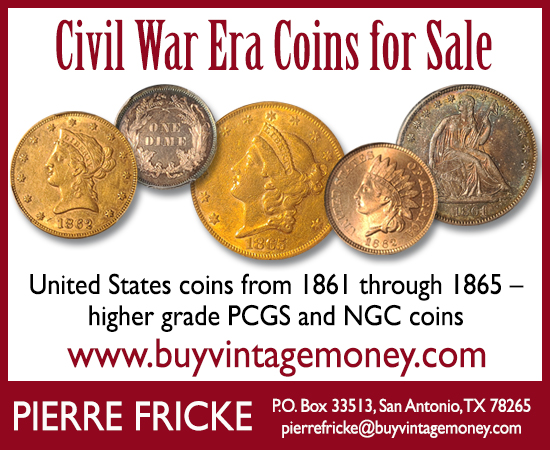
COUNTERFEITING AND MORMON MURDERS
Some strange coins (and banknotes) are out-and-out fakes. Readers may be interested in a new three-part Netflix series on Mark Hofmann and the 1985 Utah pipe bombings called "Murder Among The Mormons". Here's an excerpt from a Wall Street Journal article. -Editor
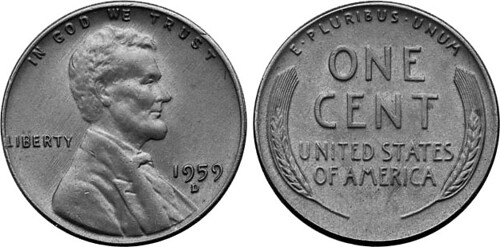
On Oct. 15, 1985, the pipe bombs started going off around Salt Lake City. The first victim was Steven Christensen, a financial consultant and collector of antiquities, who died at the door of his downtown office. The second was Kathy Sheets, who was killed at her suburban home by a device intended for her husband, J. Gary Sheets, a business associate of Christensen. The presumption, by both police and Sheets, was that "disgruntled investors" were behind the gruesome murders.
But that theory exploded the next day, as did a car driven by a well-known documents dealer named Mark Hofmann. Inside his bombed-out blue Toyota was a badly damaged Hofmann and a trove of purportedly rare Mormon papers and books, now charred and scattering in the breeze. They were intended for sale to the Church of Jesus Christ of Latter-day Saints itself. Suddenly, the case wasn't about finance and revenge. The church was involved. And the motives were unknown.
"Murder Among the Mormons," a tautly constructed, three-part Netflix Original produced by BBC Studios, is about a fairly well-known case. But the series' creators take such pains to make their story a mystery that this reviewer's inclination is not to spoil a thing.
An E-Sylum reader notes:
"Alvin Rust is shown often and a young Hofmann is shown holding a letter from the Mint relating to the 1959 wheat reverse cent. Guessing it's faked and you have to freeze frame to read. The show just talks generally about him altering coins."
Hofmann was an amazingly talented counterfeiter, creating expert-fooling documents, paper money and coins together with convincingly-believable, accurately-researched but fabricated stories of their origin and discovery. He got away with it for some time, roping in even Alvin Rust, Utah dealer and author of a book on early Mormon paper money. Rust spoke about his experience at an ANA convention one year. Hofmann's coin forgery is examined in Chuck Larsen's 2004 book, Numismatic Forgery. The Introduction illustrates the famous "1959-D Wheat Cent". -Editor
To read the complete article (subscription required), see:
‘Murder Among the Mormons' Review: An Explosive Mystery
(https://www.wsj.com/articles/murder-among-the-mormons-review-an-explosive-mystery-11614714557)
To read earlier E-Sylum articles, see:
HOFMANN'S FORGERY SECRETS REVEALED IN BOOK
(https://www.coinbooks.org/esylum_v07n20a04.html)
BOOK REVIEW: THE JUDGMENT OF EXPERTS
(https://www.coinbooks.org/v20/esylum_v20n54a06.html)
MORE ON THE FORGERIES OF MARK HOFMANN
(https://www.coinbooks.org/v21/esylum_v21n01a11.html)
FAKE MINT ERRORS
(https://www.coinbooks.org/v23/esylum_v23n38a30.html)

1697 BANK OF ENGLAND NOTE
The Bank of England Museum blog this week discusses the earliest Bank of England note in their collection. -Editor
This is the earliest Bank of England note in our collection. It's dated 18 June 1697.
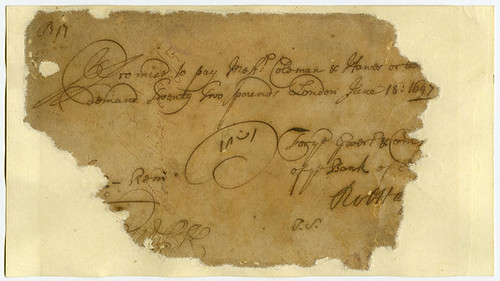
Paper money in Britain evolved from the receipts that goldsmiths gave their customers for the money that they had deposited for safekeeping.
Goldsmiths held this money as ‘running cash', (similar to a modern current account). They paid customers interest on the money they deposited, which the goldsmiths could also lend out with interest.
When the Bank of England was founded in 1694, it gave ‘notes' to its customers as receipts for their deposits. These gradually turned into modern banknotes.
The original notes had the words ‘promises to pay' on them. You can still see those words on our notes today.
To begin with, bank cashiers were told to issue notes for set denominations. But there was a lack of coins at that time, so many of the earliest notes were for odd sums and often included both shillings and pence.
This handwritten fragment is one of the earliest known examples of a running cash note issued by a Bank of England cashier. It promises to pay the bearer £22 (£3,964.99 today), which means it could be exchanged for that value of gold. The inscription shows that the deposit was withdrawn in two payments (£5 and £17). The handwriting is hard to read, but after a fair bit of squinting we're pretty sure it's addressed to ‘Messrs Coleman and Hawes'.
To read the complete article, see:
Our earliest Bank of England note
(https://www.bankofengland.co.uk/museum/blog/our-earliest-bank-of-england-note)
MORMON BRIGHAM CITY CO-OP SCRIP
Doug Nyholm edits The Mint Master for the Utah Numismatic Society. In the March 2021 issue he authored an article on the Brigham City Co-op scrip notes. With permission, we're republishing it here. Thanks! -Editor
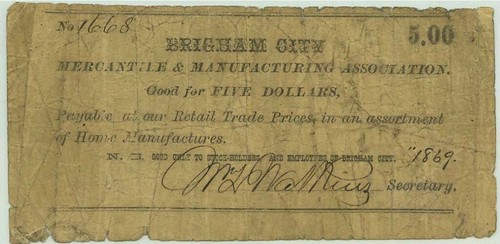
BRIGHAM CITY CO-OP
In the Oct 1865 conference Brigham Young announced that the saints should help one another. ‘Let every one of the Latter-day Saints, male and female, decree in their hearts that they will buy of nobody else but their own faithful brethren, who will do good with the money they shall obtain. I know it is the will of God that we should sustain ourselves, for, if we do not, we must perish, so far as receiving aid from any quarter, except God and ourselves....We have to preserve ourselves, for our enemies are determined to destroy us."
The first LDS cooperative institution was founded in 1864 in Brigham City under the direction of Lorenzo Snow of the Quorum of the Twelve. Initially the towns name was Box Elder which was changed to Brigham City. This was so successful that it served as a model to other Co-ops to come.
Elder Snow wrote in an 1875 letter to President Young that his main objective for the cooperative movement was ‘to unite together the feelings of the people by cooperating their interests with their means and make them self-sustaining according to the spirit of your teachings and to make them independent of Gentile stores.'
The "Brigham City Mercantile & Manufacturing Association," for which several very rare notes are pictured, was the first of the Co-ops to open in the Utah Territory. It was established in 1864 under the direction of Lorenzo Snow. Snow would later become President of the Church of Jesus Christ of Latter-day Saints.
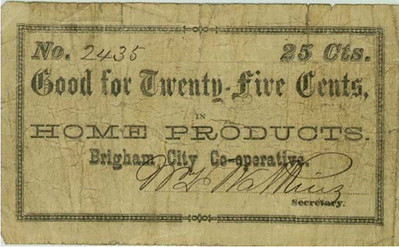
Virtually everyone in the Territory was poor, and the Co-op's allowed them to own shares which eventually helped them achieve prosperity. Part of the workers wages were also paid in part with scrip from these Co-op's. As a result there was an explosion of Co-op's in the Territory many of which issued scrip. Some additionally issued tokens.
Settlement of Brigham City began in 1851. Originally called Box Elder due to its proximity along Box Elder Creek. Renamed Youngsville and finally named Brighan City in 1855. The coop failed in 1877 due to a devastating fire in the Woolen factory. This was followed by an excessive federal tax assessment on coop scrip in 1879 which ultimately crippled coops. Most of the coops' holdings were sold off to private individuals over the next few years.
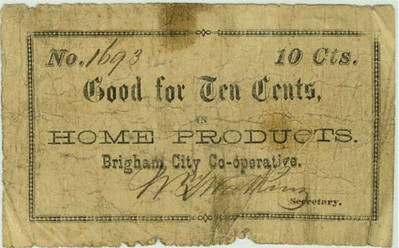
THE BOOK BAZARRE
VENEZUELA ISSUES NEW INFLATION BANKNOTES
Howard Berlin passed along this Reuters article about the new nearly worthless Venezuela inflation banknotes. Thanks. -Editor
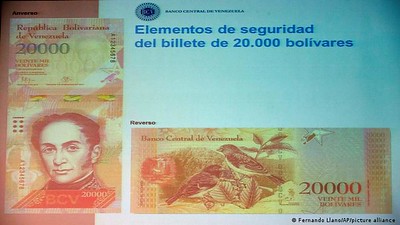 The Central Bank of Venezuela (BCV) announced Friday the introduction of three new banknotes: 200,000, 500,000 and one million bolivars.
The Central Bank of Venezuela (BCV) announced Friday the introduction of three new banknotes: 200,000, 500,000 and one million bolivars.
But with inflation skyrocketing, the highest denominated bill has a value of just $0.52 cents (€0.44 cents), according to the official rate.
These new notes will circulate alongside the 10,000-, 20,000-, and 50,000-bolivar bills currently in use.
But even the highest valued is worth only about $0.02 cents at current exchange rates.
Over the last few years, various Venezuelan governments have turned to printing new banknotes at different denominations as a way to get ahead of spiraling inflation.
But with interannual inflation rates running at 2,665% as of January, according to the central bank, the use of Venezuelan paper money has almost completely disappeared in favor of cards.
For the most part, prices in Venezuela are denominated in US currency, when stores show it.
To read the complete article, see:
Venezuela to introduce 1-million-bolivar bill
(https://www.dw.com/en/venezuela-to-introduce-1-million-bolivar-bill/a-56791252)
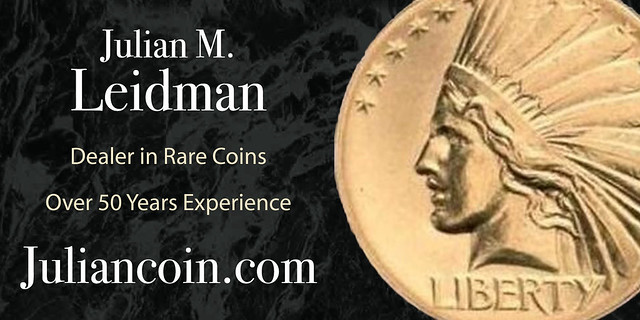
THE INSTAGRAMER'S FAKE BANKNOTE TOSS
Moving from almost-worthless to truly worthless banknotes, here's the story of an Instagram stunt in Dubai. -Editor
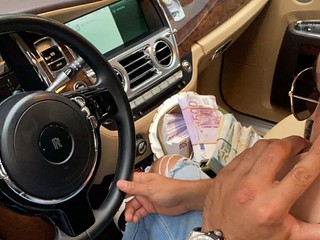 The Dubai Court of First Instance on Sunday sentenced a Dubai-based businessman to two years in jail after a video went viral showing him throwing 50,000 fake euro notes at a group of workers while driving a luxury car.
The Dubai Court of First Instance on Sunday sentenced a Dubai-based businessman to two years in jail after a video went viral showing him throwing 50,000 fake euro notes at a group of workers while driving a luxury car.
The 32-year-old Ukrainian businessman claimed that he posted the video on his Instagram page to gain more followers. Dubai Police searched the businessman's house and found $740,000 (Dh2.7 million) and 467,000 euros (Dh2 million) in fake banknotes.
Police said the defendant endangered the workers' lives as they ran after his moving car and could have been hit by other cars. The defendant was eventually arrested at the parking lot of a shopping centre by Dubai Police.
His Instagram account, which has nearly 400,000 followers, showed him living a tycoon's life with expensive cars like a Rolls-Royce, Bentley, Ferrari and Lamborghini.
Many pictures and videos in the account show the defendant holding a wad of dollars and euros. "We searched his house and found thousands of fake dollars and euros. He ordered the dollars from China and the euros were bought for Dh1,000 from an Indian man," added the Emirati policeman.
To read the complete article, see:
Man in Dubai jailed for throwing fake euro currency notes to gain followers
(https://gulfnews.com/uae/crime/man-in-dubai-jailed-for-throwing-fake-euro-currency-notes-to-gain-followers-1.77507389)
TECHNOLOGY UNLOCKS LOCKED LETTERS
Bibiliophiles and researchers should appreciate the sleuthing technology described in this story from the Netherlands passed along by Len Augsburger. Thanks. -Editor
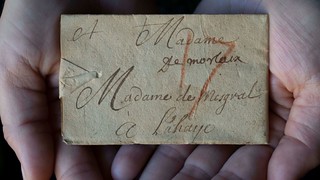 hree hundred years ago, before envelopes, passwords and security codes, writers often struggled to keep thoughts, cares and dreams expressed in their letters private.
hree hundred years ago, before envelopes, passwords and security codes, writers often struggled to keep thoughts, cares and dreams expressed in their letters private.
One popular way was to use a technique called letter locking -- intricately folding a flat sheet of paper to become its own envelope. This security strategy presented a challenge when 577 locked letters delivered to The Hague in the Netherlands between 1689 and 1706 were found in a trunk of undelivered mail.
The letters had never reached their final recipients, and conservators didn't want to open and damage them. Instead, a team has found a way to read one of the letters without breaking its seal or unfolding it in any way. Using a highly sensitive X-ray scanner and computer algorithms, researchers virtually unfolded the unopened letter.
"This algorithm takes us right into the heart of a locked letter," the research team said in a statement.
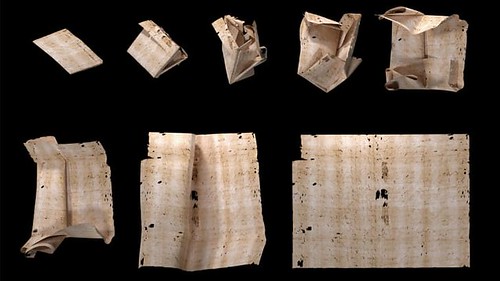
"Sometimes the past resists scrutiny. We could simply have cut these letters open, but instead we took the time to study them for their hidden, secret, and inaccessible qualities. We've learned that letters can be a lot more revealing when they are left unopened."
The technique revealed the contents of a letter dated July 31, 1697. It contains a request from Jacques Sennacques to his cousin Pierre Le Pers, a French merchant in The Hague, for a certified copy of a death notice of Daniel Le Pers.
In the shades-of-Indiana-Jones department, Len adds:
"This reminds me of an event about 20 years ago. I was working with a group of correspondence in an archive, and one of the letters was unopened. I asked the curator about it, who promptly pulled a knife out of his desk and did the deed."
To read the complete article, see:
Rare 'locked' letter sealed 300 years ago is finally opened virtually
(https://www.cnn.com/style/article/opening-sealed-letters-study-scn/index.html)

LOOSE CHANGE: MARCH 7, 2021
Here are some additional items in the media this week that may be of interest. -Editor
We don't usually discuss grading and pricing, but it's good to see rare finds reported in the media, bringing attention to interesting coins and the hobby in general. Antiques Trading Gazette published an article about the sale of the 1757 Jacques-Antoine Dassier 10 ruble piece (discussed here on January 10th). It's also an example of a coin with a collector's mark (discussed in February). -Editor
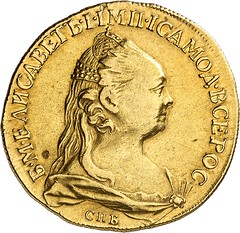
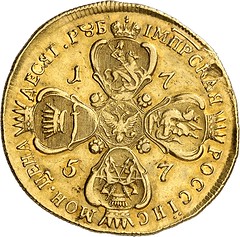
The coin with the most newsworthy story was a gold 10 ruble piece, struck in 1757 from a die by the Swiss medallist Jacques-Antoine Dassier during the reign of Empress Elizabeth of Russia.
The coin was found by a Berlin pensioner among the effects of his deceased father, who had been born in St Petersburg.
Having been turned away by one dealer, who thought it was a fake, and being offered €900 by another, the owner eventually brought it to Künker, where it was priced at €150,000.
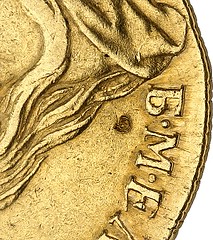 An added attraction was its provenance: a hallmark impressed in the coin showed it to have belonged to the 19th century Russian collector Count Emeryk Hutten-Czapski, who owned more than 11,000 coins and other works of art.
An added attraction was its provenance: a hallmark impressed in the coin showed it to have belonged to the 19th century Russian collector Count Emeryk Hutten-Czapski, who owned more than 11,000 coins and other works of art.
The rarity was not lost on the handful of international bidders who joined in, with the hammer falling at €210,000 (£185,840).
To read the complete article, see:
‘Fake' coin proves to be the €210,000 real deal
(https://www.antiquestradegazette.com/print-edition/2021/march/2482/international/fake-coin-proves-to-be-the-210-000-real-deal/)
To read the earlier E-Sylum articles, see:
THE 1757 DASSIER 10-RUBLE COIN
(https://www.coinbooks.org/v24/esylum_v24n02a26.html)
VOCABULARY TERM: COLLECTOR'S MARK
(https://www.coinbooks.org/v24/esylum_v24n06a16.html)
COLLECTOR'S MARKS AND THE DEXTER 1804 DOLLAR
(https://www.coinbooks.org/v24/esylum_v24n07a14.html)
Here's another interesting coin find story from Michigan. -Editor
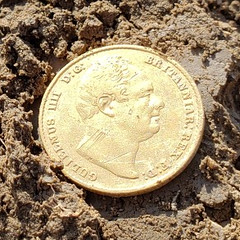 The group has found plenty of small pieces through their times that they cherish, including a Seated Liberty Half Dime and a Flying Eagle Cent. However, nothing compares to what they uncovered this past spring.
The group has found plenty of small pieces through their times that they cherish, including a Seated Liberty Half Dime and a Flying Eagle Cent. However, nothing compares to what they uncovered this past spring.
"When I dug it out of the hole, I just kind of saw the gold edge of the coin." Chandler said. "They thought I had silver. I opened up the dirt and I was like that's a gold coin." A 1836 British Sovereign Gold Coin to be specific, which around here is an extremely rare find. "We thought, what's an 1836 British gold coin doing in Jamestown? I talked to a couple people from the United Kingdom and they said those are rare over there."
To read the complete article, see:
VC Variety uncovers rare treasure in West Michigan
(https://www.fox17online.com/news/local-news/lakeshore/ottawa/vc-variety-uncovers-rare-treasure-in-west-michigan)
Here's another old coin found in a strange place. Arthur Shippee passed along this story about an ancient Roman coin uncovered by a metal detectorist in Vancouver, Canada. Thanks. -Editor
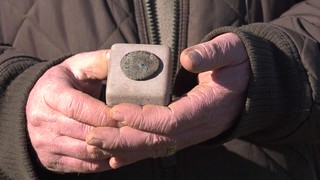 Chris Monk was scanning the ground with his metal detector near Pacific Spirit Park in Vancouver when he came across something unusual.
Chris Monk was scanning the ground with his metal detector near Pacific Spirit Park in Vancouver when he came across something unusual.
His detector alerted him to something under the grass, so he started digging. Six inches down, he found an old coin. He put it in his pocket and took it home.
Once home, he began cleaning the coin, and posted pictures of it in online metal detecting groups. In the online groups, members alerted him to the significance of the coin -- they told him it was an ancient Roman coin.
To read the complete article, see:
Ancient Roman coin found in park near UBC with metal detector
(https://bc.ctvnews.ca/ancient-roman-coin-found-in-park-near-ubc-with-metal-detector-1.5327805)


